
| JAPANESE | TOP PAGE | |
|---|---|---|
| 0 | 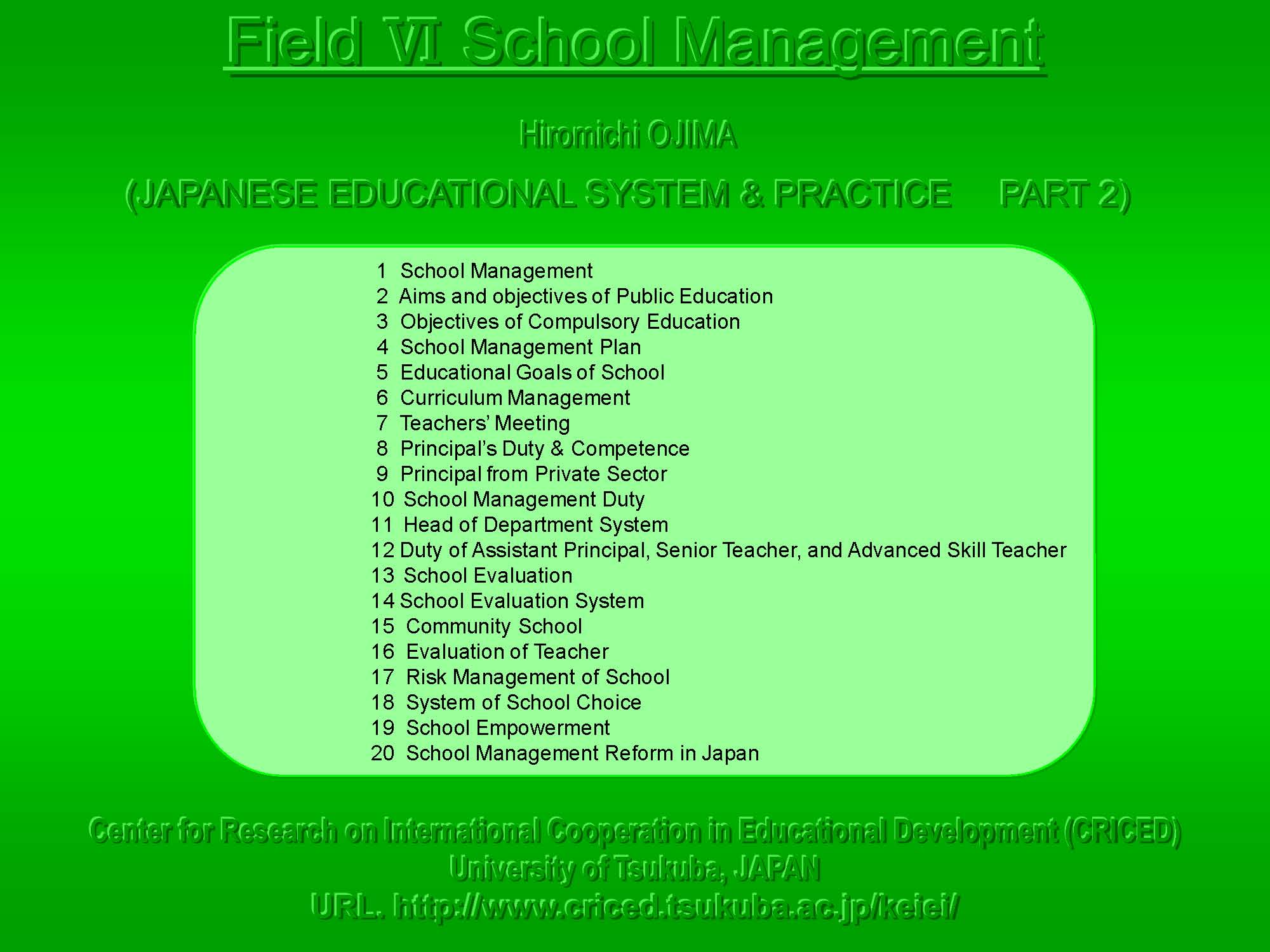 |
Download : VI School Management |
| 1 | 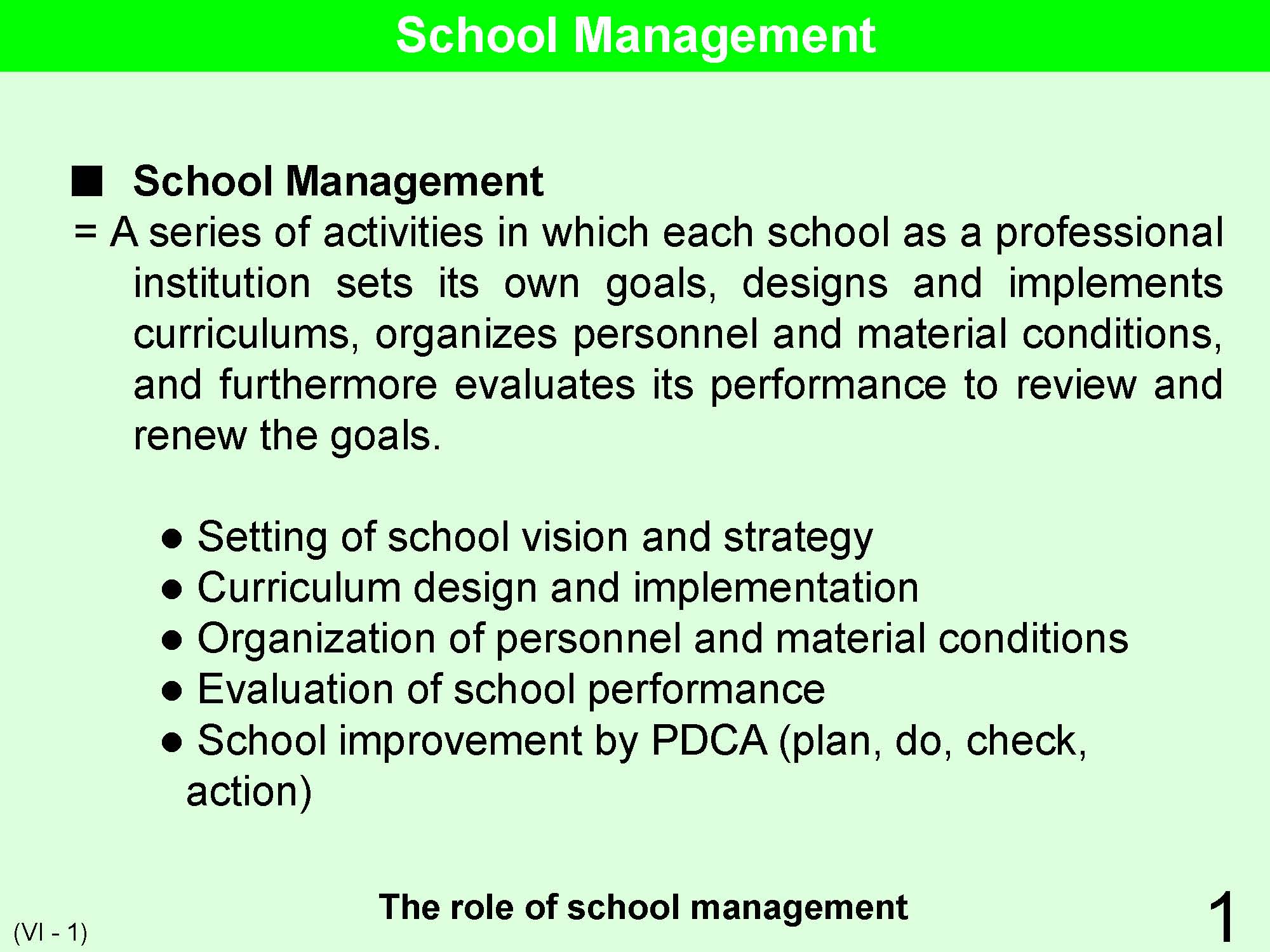 |
School management is the systematic and continuous activity in which each school sets its school vision and strategy, procures and invests management resources such as people, goods, capital, and information, and tries to realize them as an organization. School management concerns education, personnel, budget, facility, organization, and external issues. It is school management to plan, implement, and evaluate these issues from the standpoint of school vision, and to lead to the next action for improvement. |
| 2 | 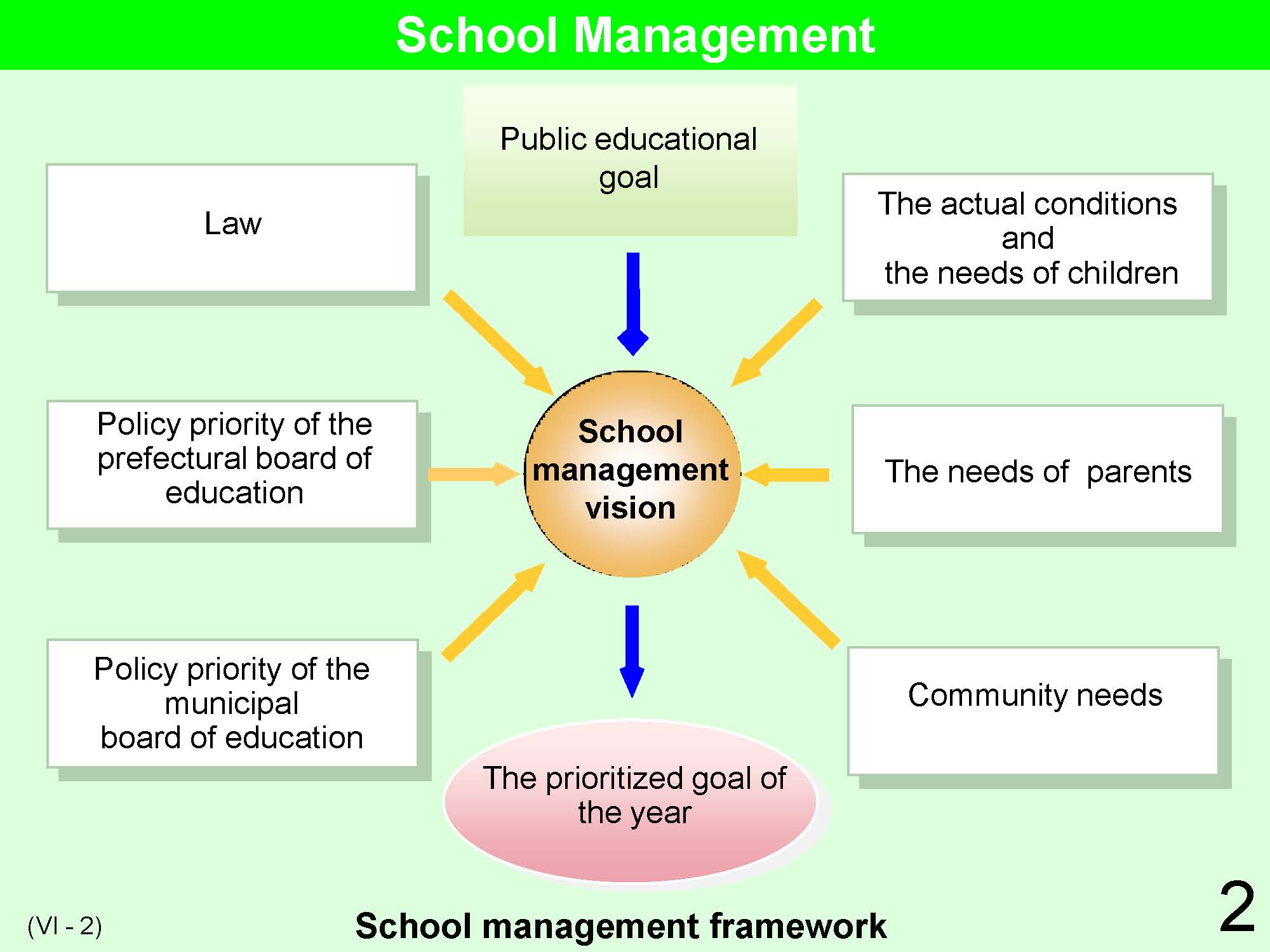 |
Since school is public educational institute, school needs to make clear on a management policy and important goals, relating to carry out education as professional educational institution, and to make a school management plan. When doing that, school needs to care about laws, policies of board of education, actual condition of children, and needs of parents and community. |
| 3 | 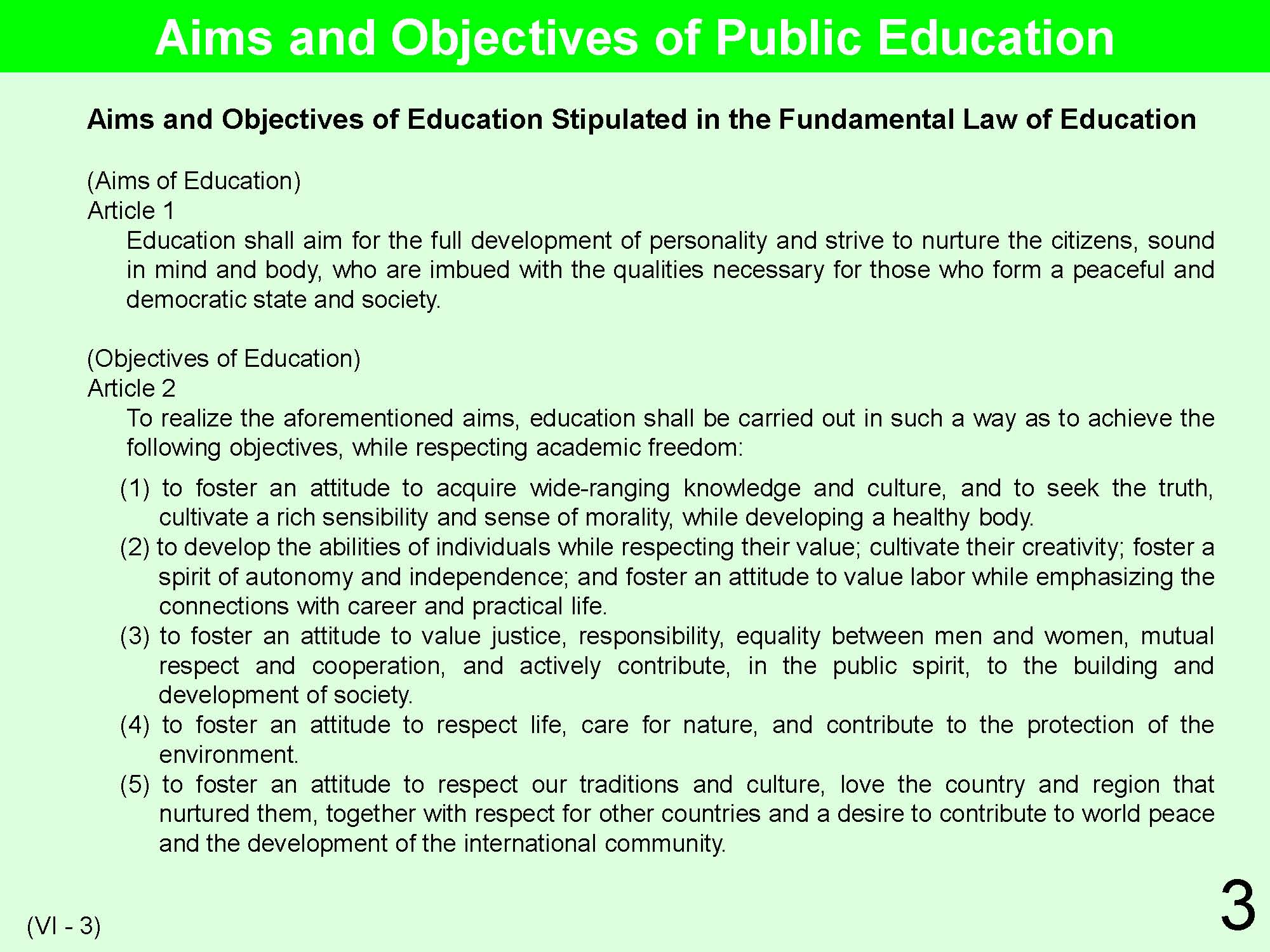 |
Educational aims and objectives are prescribed in Article 1 and 2 of the Fundamental Law of Education. School education by professional institutions of public education shall be conducted under these provisions. |
| 4 | 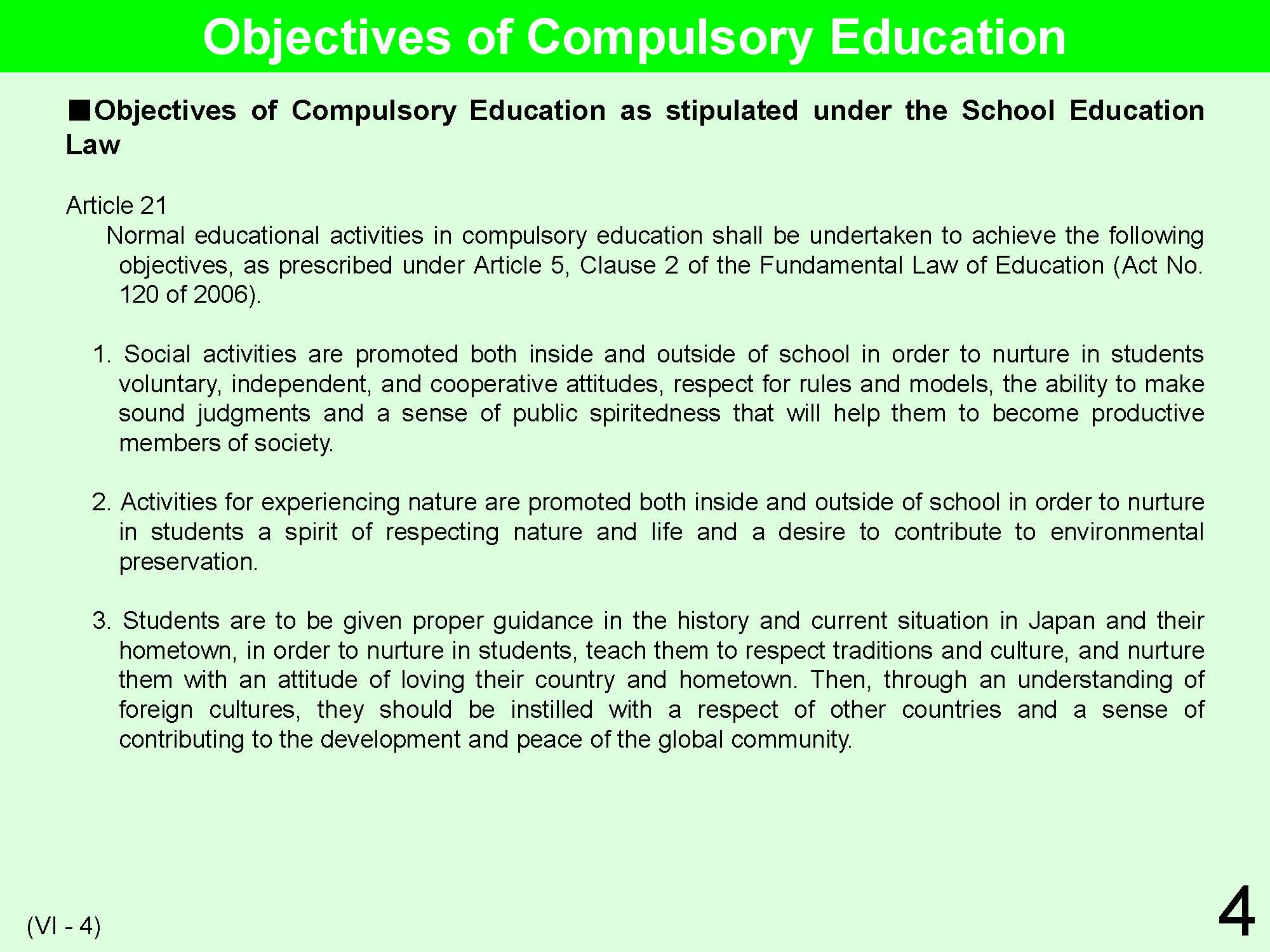 |
The objectives of compulsory education are prescribed in Article 21 of the School Education Law. School education at the compulsory stage shall be carried out to achieve these goals. |
| 5 | 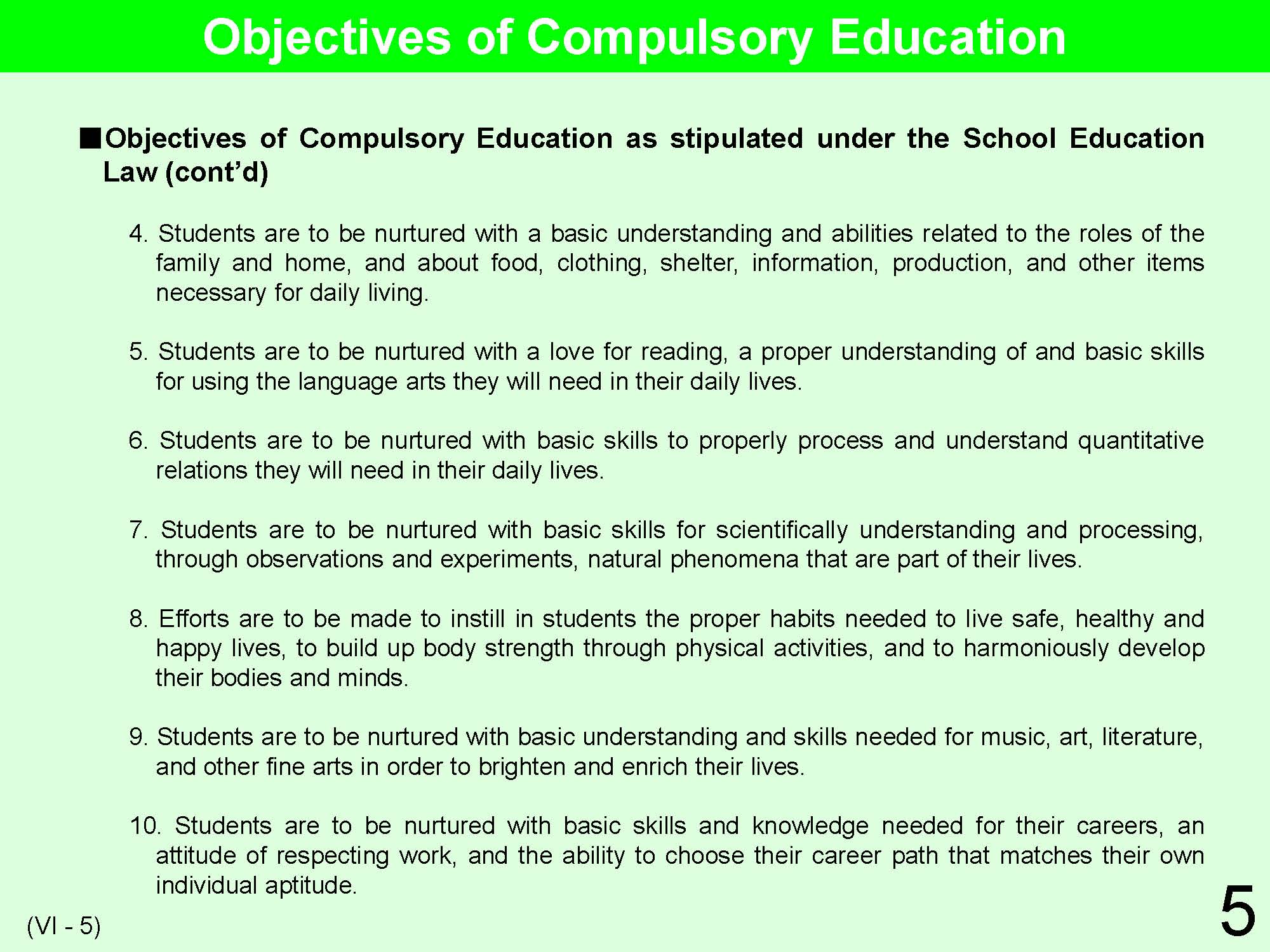 |
The goals of Compulsory Education are prescribed in Article 21 of the School Education Law. School Education in the compulsory stage shall be carried out to achieve these goals. |
| 6 | 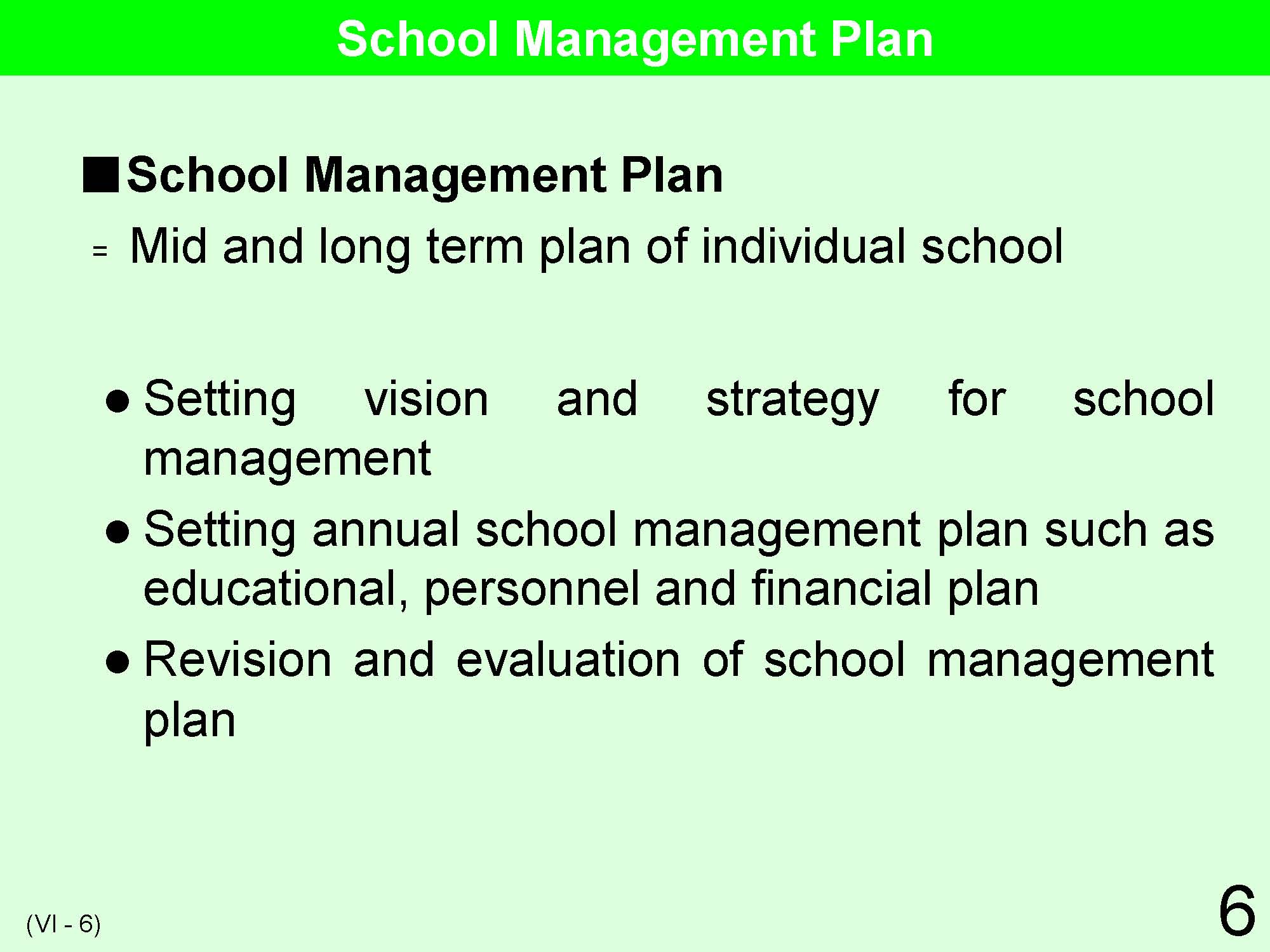 |
Each school sets mid-term and long-term management vision and strategy, and based on those, it makes management plans. In the plans, annual educational plan, personnel plan, and financial plan are written down besides the vision and the strategy of school management. It is crucial to revise and evaluate the current situation for school management plans. |
| 7 | 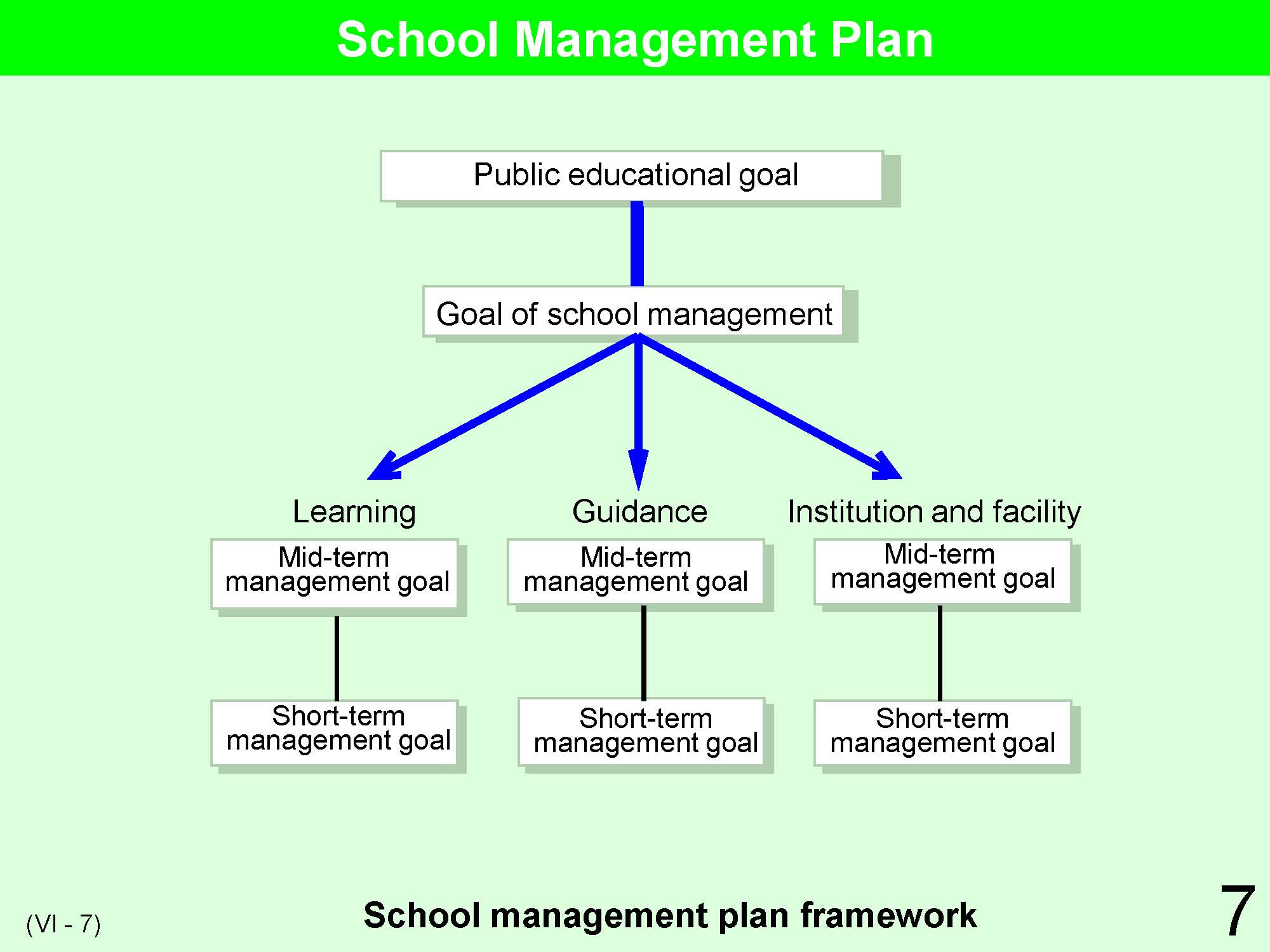 |
Elements of school management plans are; individual plans such as educational plan, personnel plan, financial plan, facility plan, organization plan, and external plan, besides the vision and the strategy of school making, and a comprehensive plan. In the comprehensive plan and individual plans, school needs to be clear on the goals to be achieved, for example by setting numerical values, and to carry out management evaluation to ensure accountability. |
| 8 | 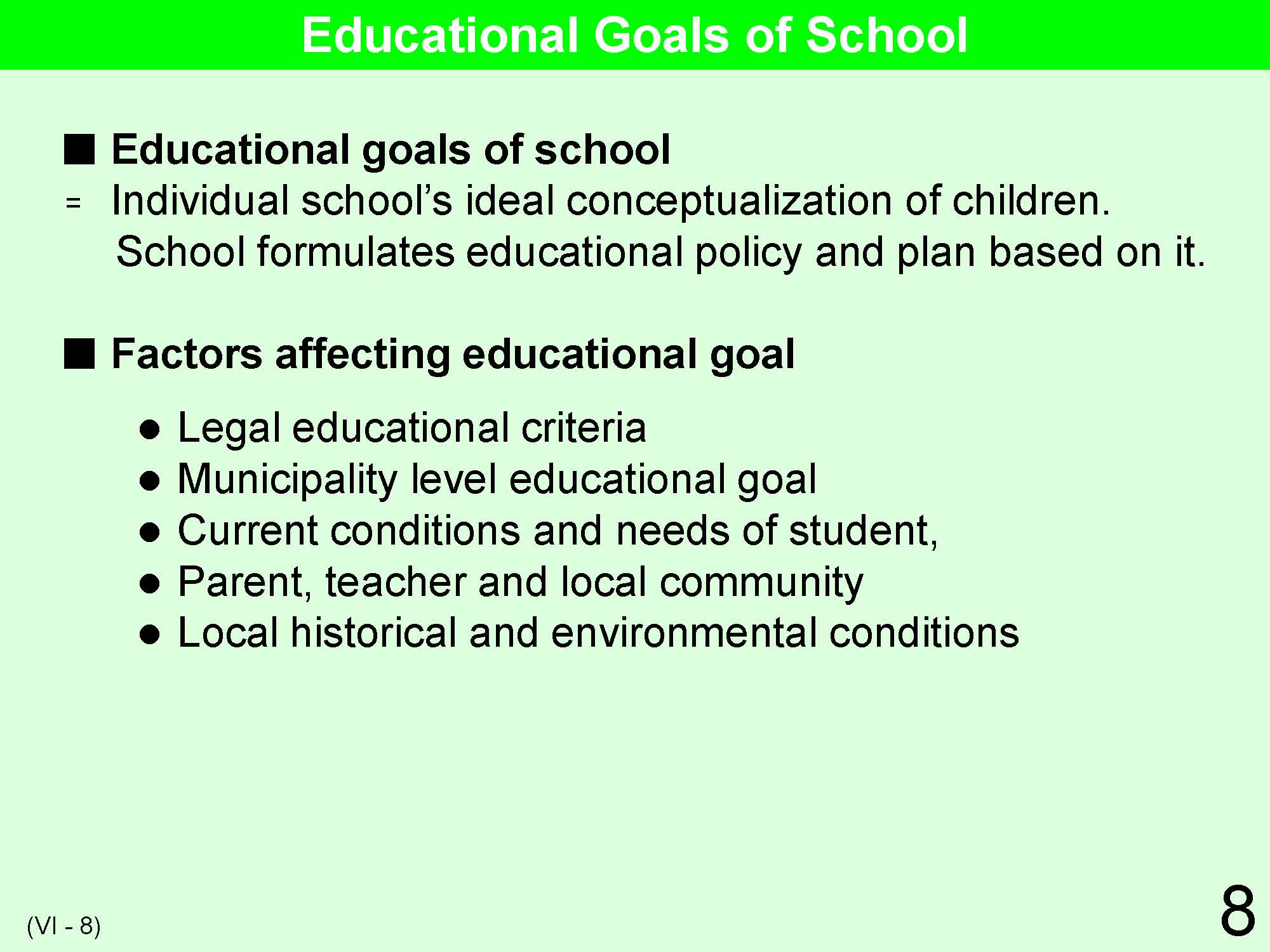 |
Each school needs to develop education and management based on public education goals described in laws and the course of study by the state. Educational goals set by the state are defined in the School Education Act for each type of school. Based on that, the course of study shows concrete goals to be achieved in educational activities. For example, the course of study for elementary school defines that, “each school should try to fulfil education, which develops personality of each student, by nurturing the ability of the students to learn and think by themselves and also the knowledge on basic contents, while it aims to nurture the various capacity of the students and develops distinctive and creative educational activities.” Educational goals of school needs to be set with consideration about actual conditions of children and school, and needs of the community. For example, there is a school that focuses on the “nurturing of the ability to learn and think by oneself” as its educational goal. |
| 9 | 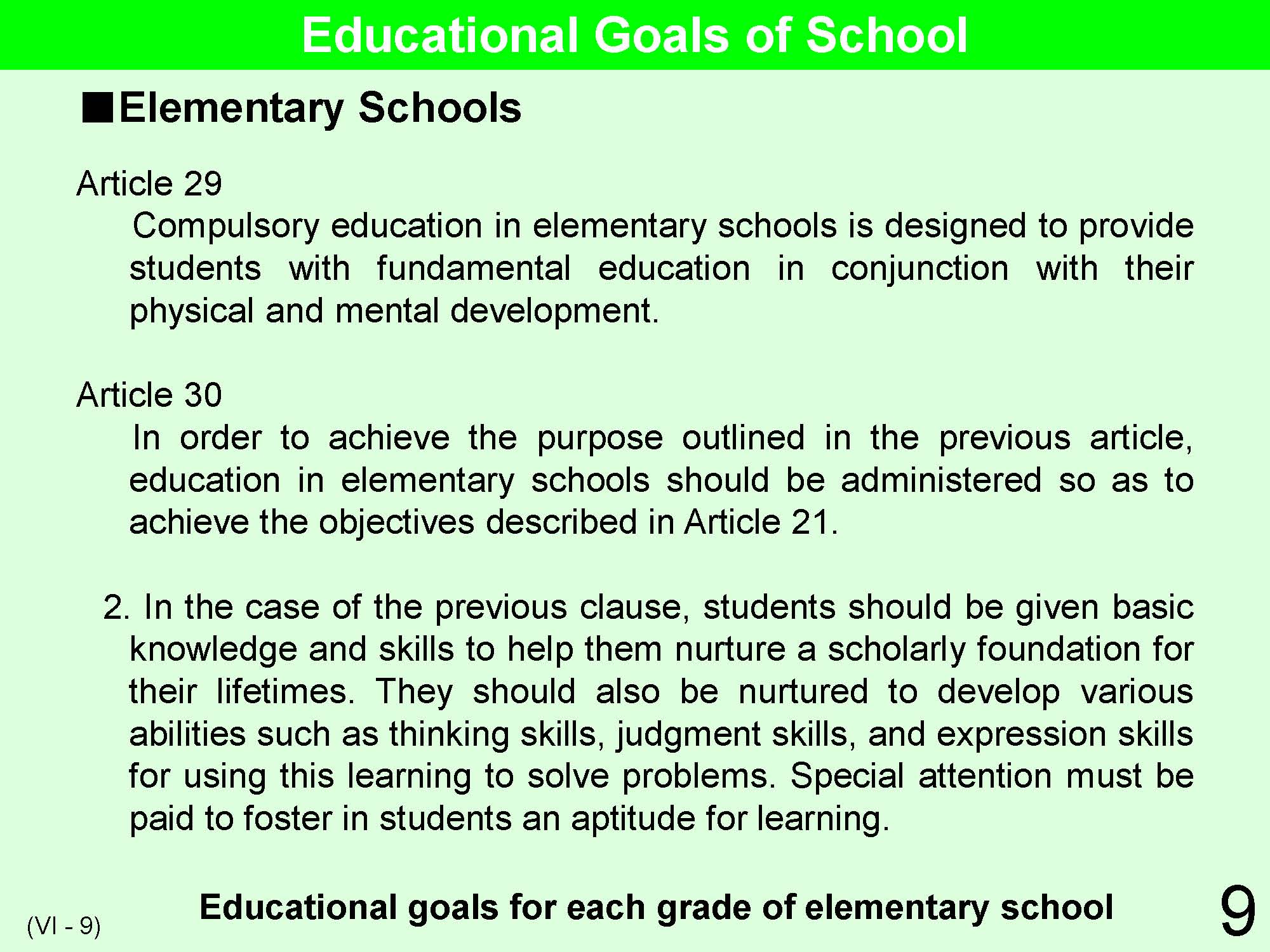 |
Educational goals and objectives of elementary schools are prescribed in Article 29 and 30 of the School Education Law. Also, the standard on concrete content of education in elementary schools is provided in the Course of Study, and it is to be revised every 10 years. |
| 10 | 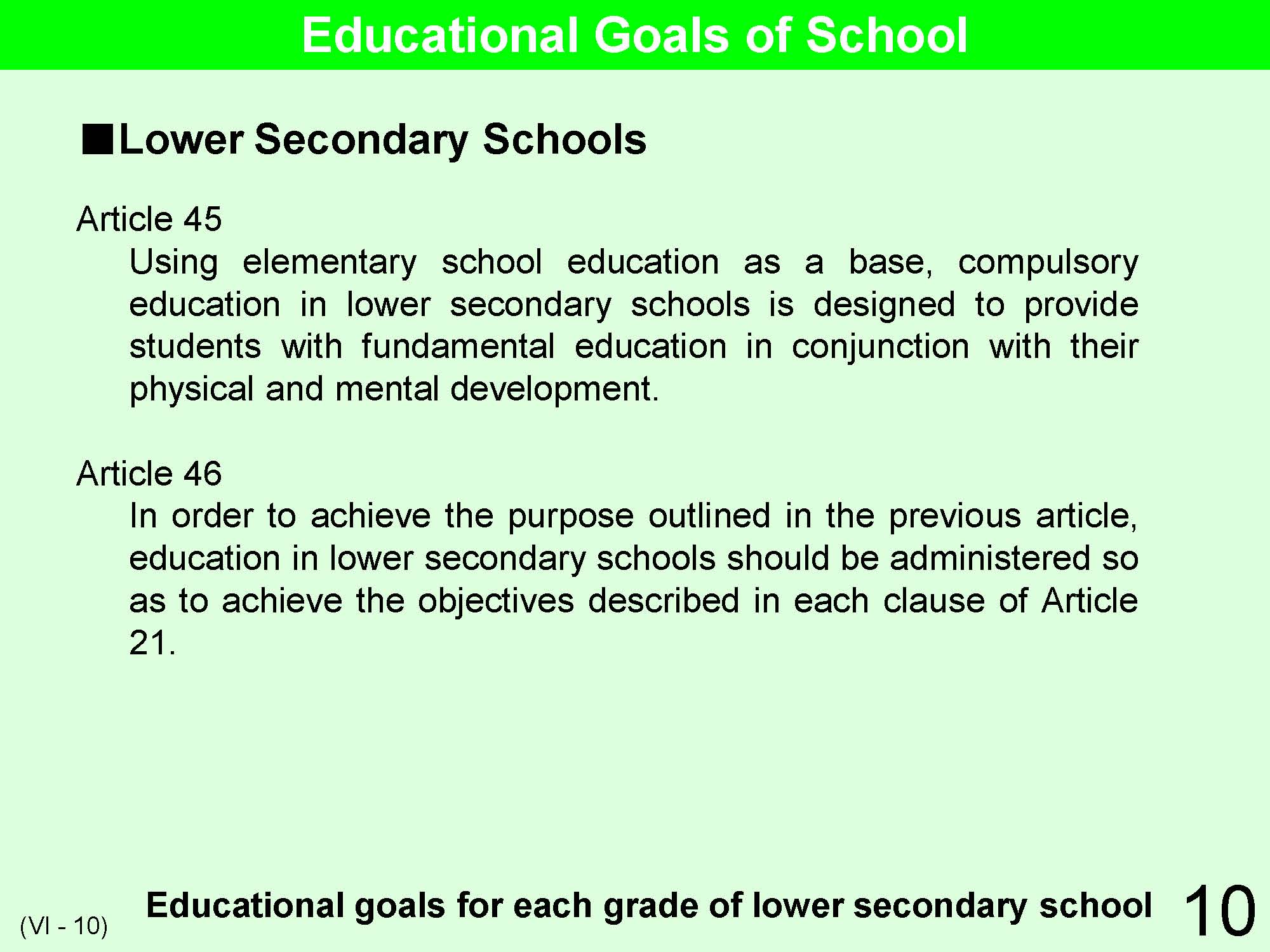 |
Educational goals and objectives of lower secondary schools are prescribed in Article 45 and 46 of the School Education Law. Also, the standard on concrete content of education in lower secondary schools is provided in the Course of Study, and it is to be revised every 10 years. |
| 11 | 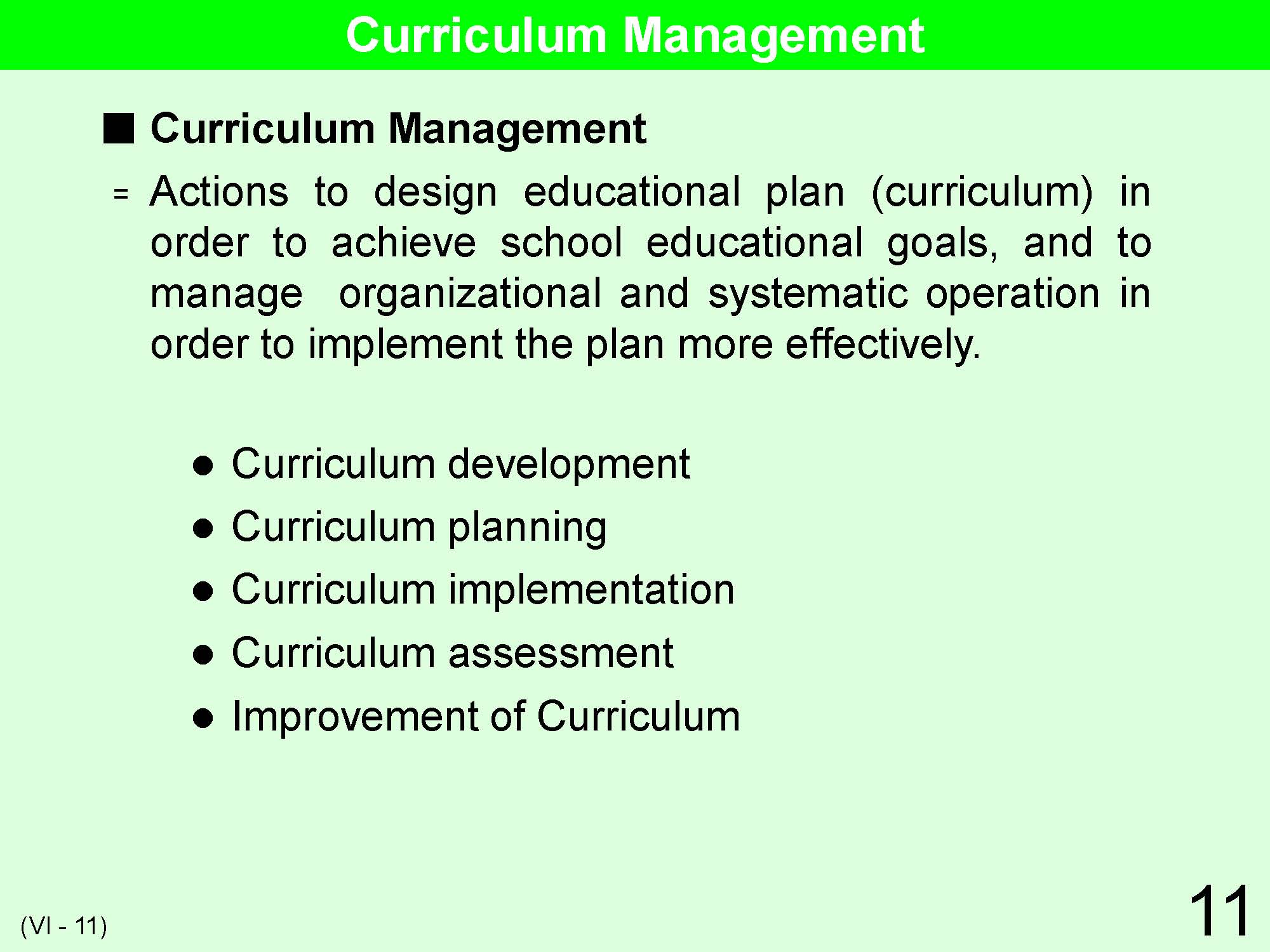 |
Each school organizes its curriculum. Curriculum management is the activity on development, organization, implementation, evaluation and improvement of the curriculum. Curriculum management is becoming more important than ever, because of the need to structure autonomous school management. (The period of integrated study -->Ⅳ 64-68) |
| 12 | 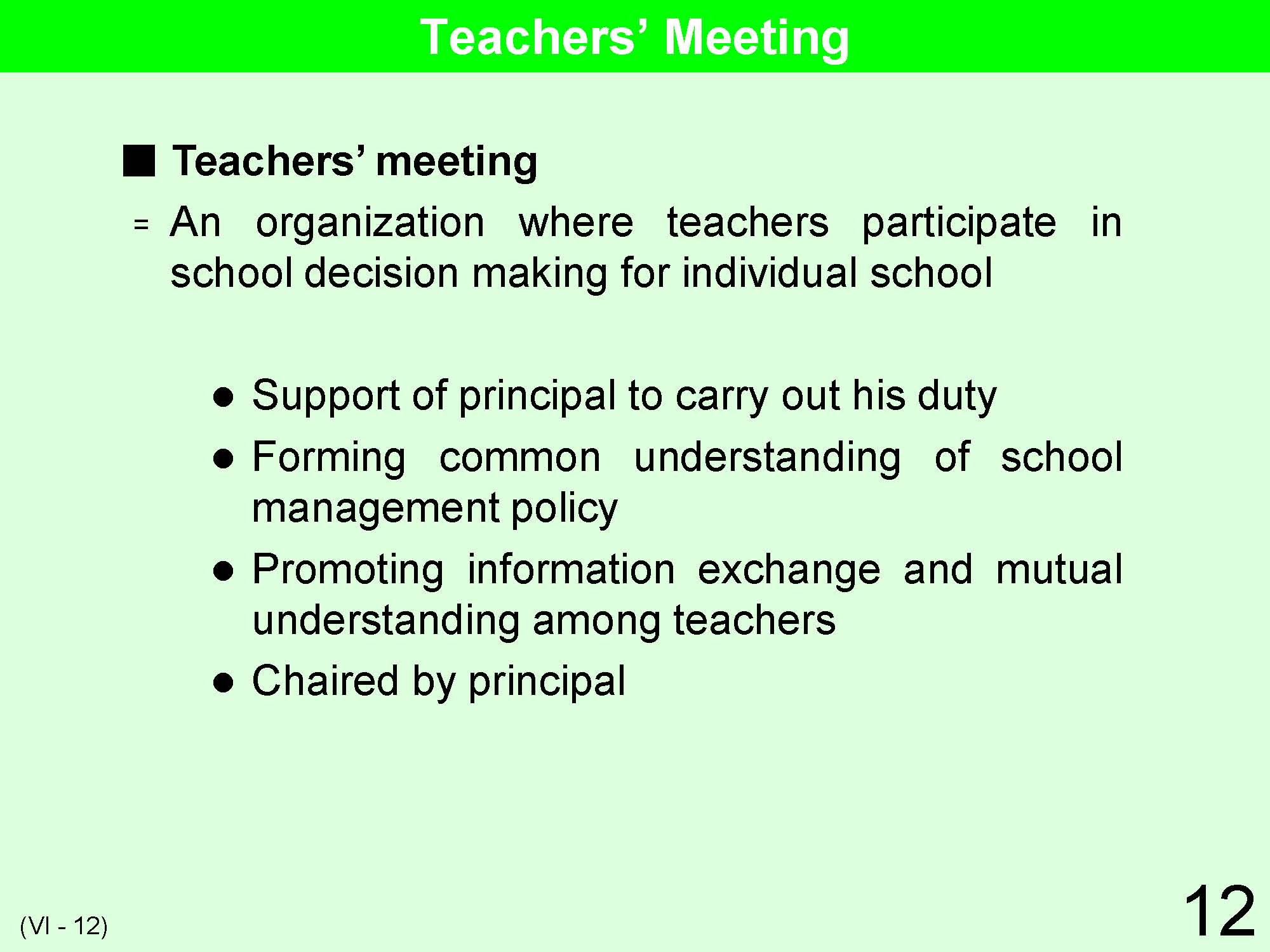 |
Teachers' meeting is the organization that enables teachers to participate in school decision making and it is set at each school. Its institutional roles are: (1) to support duties of principal, (2) to form common understanding on management policy of school, (3) to create opportunities of information exchange and mutual understandings of teachers. In reality, it is considered to be an organization that makes teachers participate in school decision making. |
| 13 | 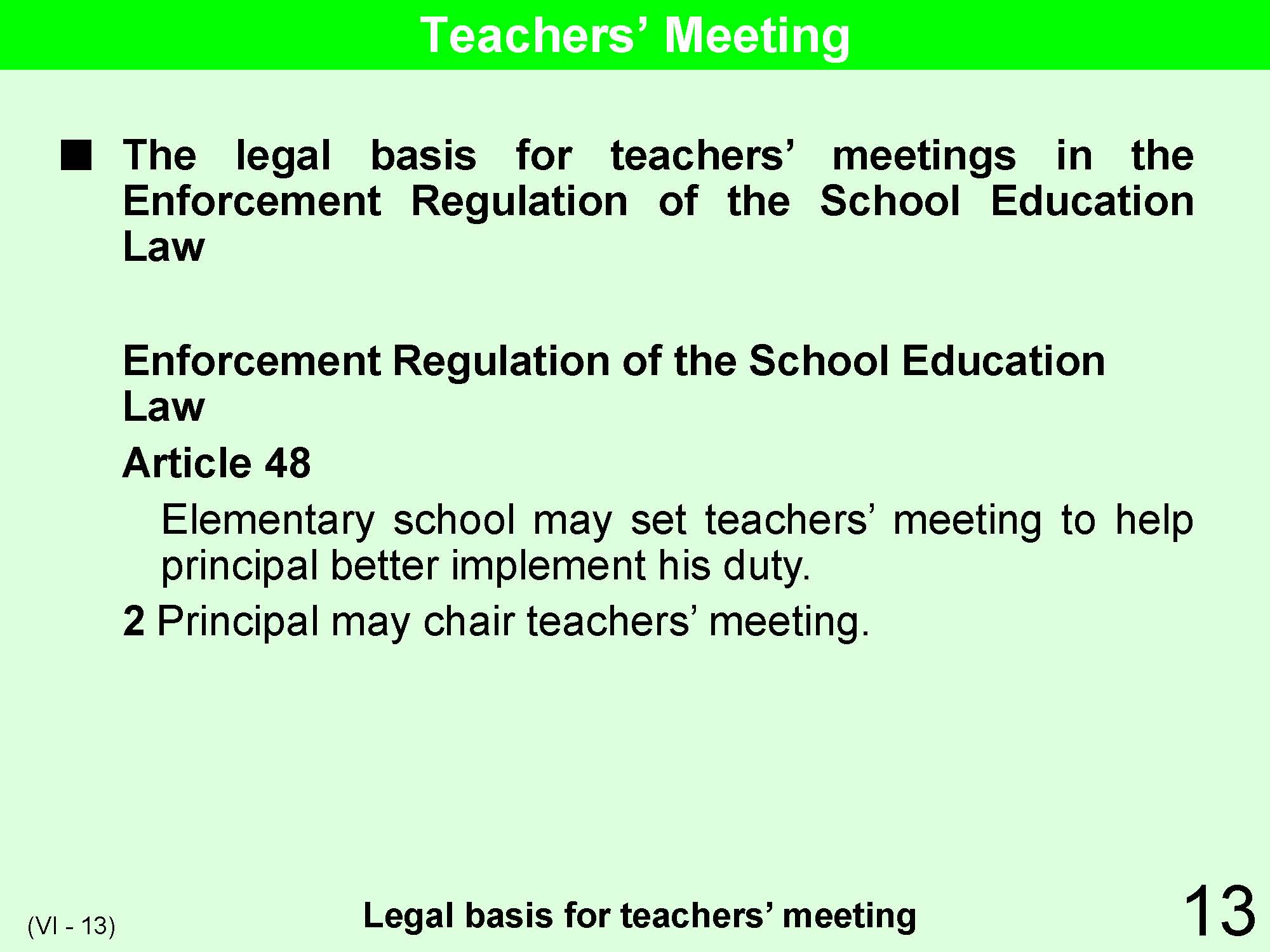 |
Teachers’ meetings had been held as a convention for organizational operation of school, and there were no legal regulations until 2003. The revision of the Enforcement Regulation of the School Education Law in 2003 gave teachers’ meetings an official institutional position. Though there had been arguments over whether its function is more as a decision-making body or as a consultative body of subsidiary board for school principals, teachers’ meetings were clarified as functioning as subsidiary boards for the principal. |
| 14 | 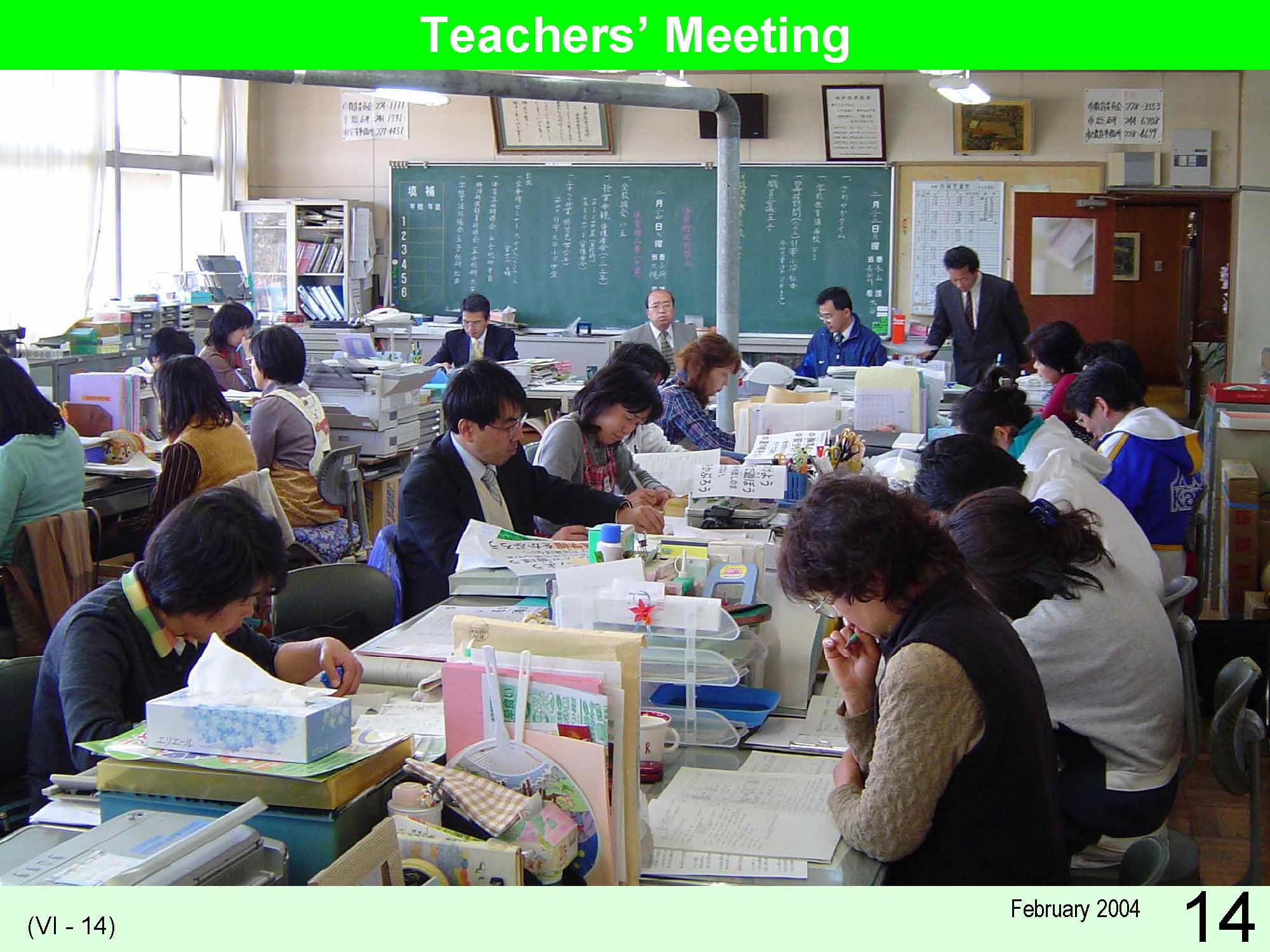 |
|
| 15 | 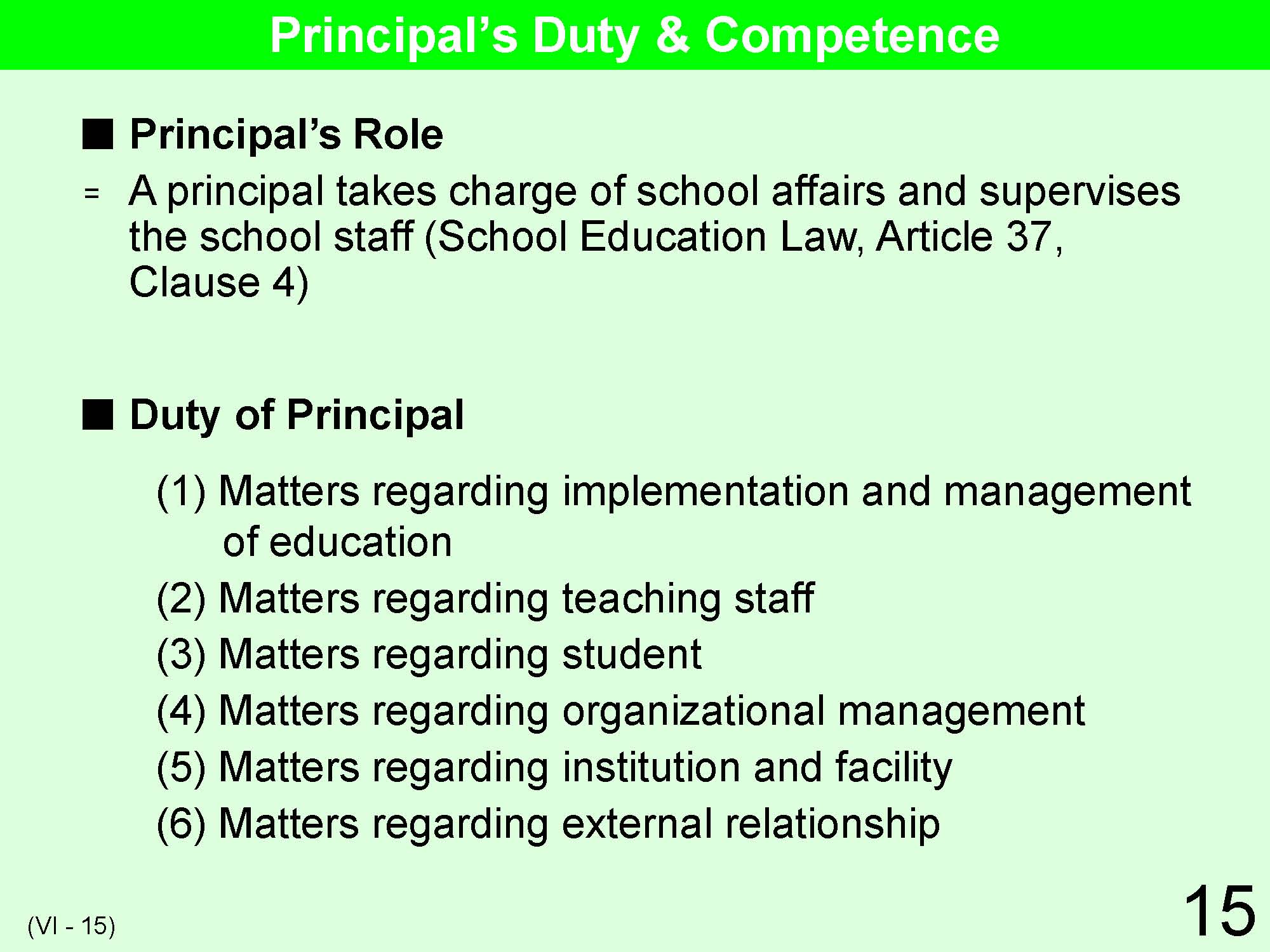 |
A principal is stationed at each school as the person in charge of school. Duties of the principal are matters on enforcement and management of education, teachers, students, school organizational management, school facilities and equipment, and external relationships. With the expansion of school authority, the principal is required to have the ability of setting the vision and strategy of school making, ability of management and leadership. |
| 16 | 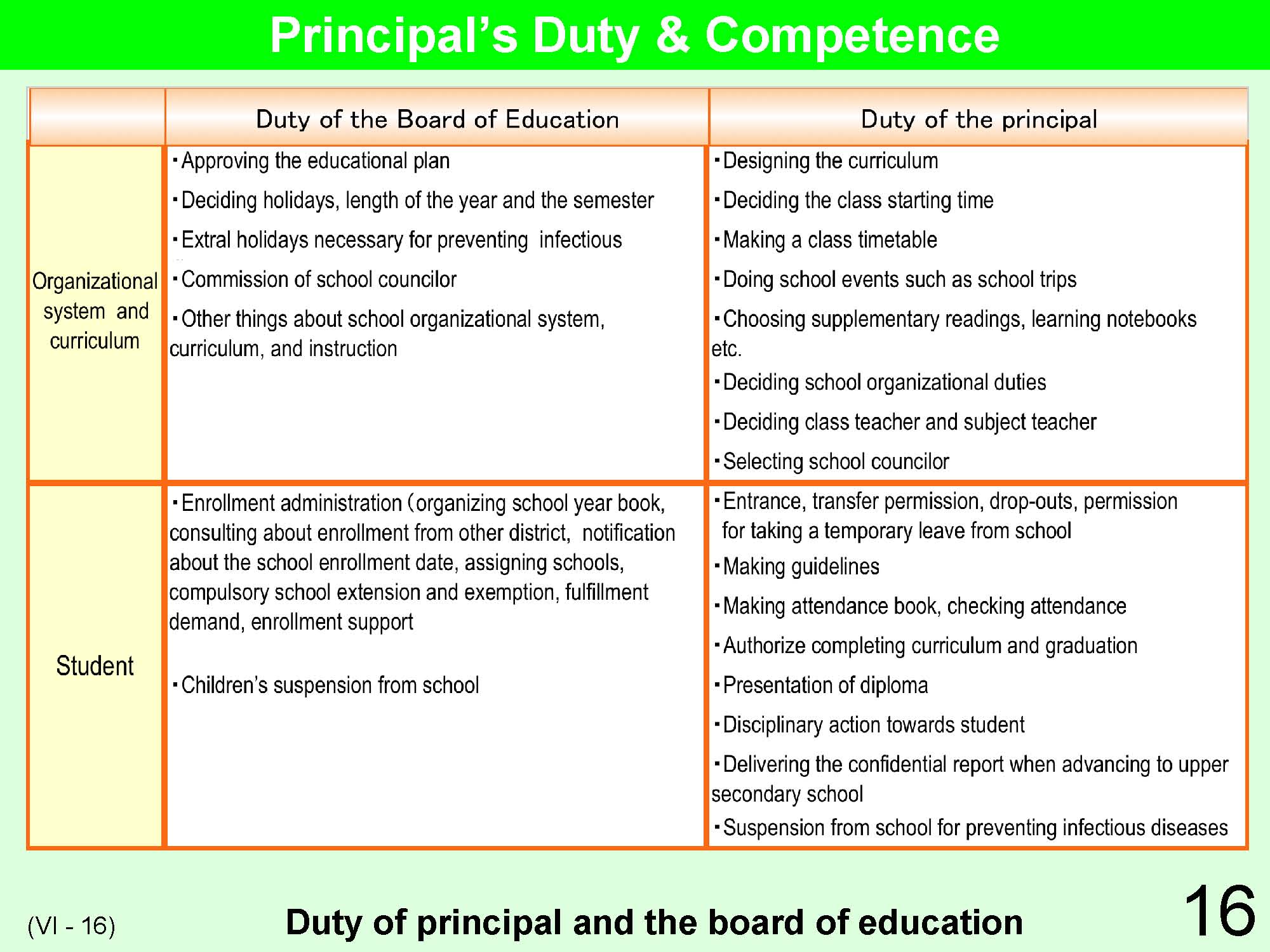 |
Today, each school seeks emphasize and focus on curricular activities. Schools now have greater local discretion, and local communities are more involved in school management than before. Elevating and upgrading the qualifications required of school principals as school leaders is also a current issue. School leaders who have the capacity to manage school are needed in order to achieve educational goals of individual schools as well as to develop educational activities efficiently by considering alternative options for changes in and out of schools. (School Leader-->VIII 29-31) |
| 17 | 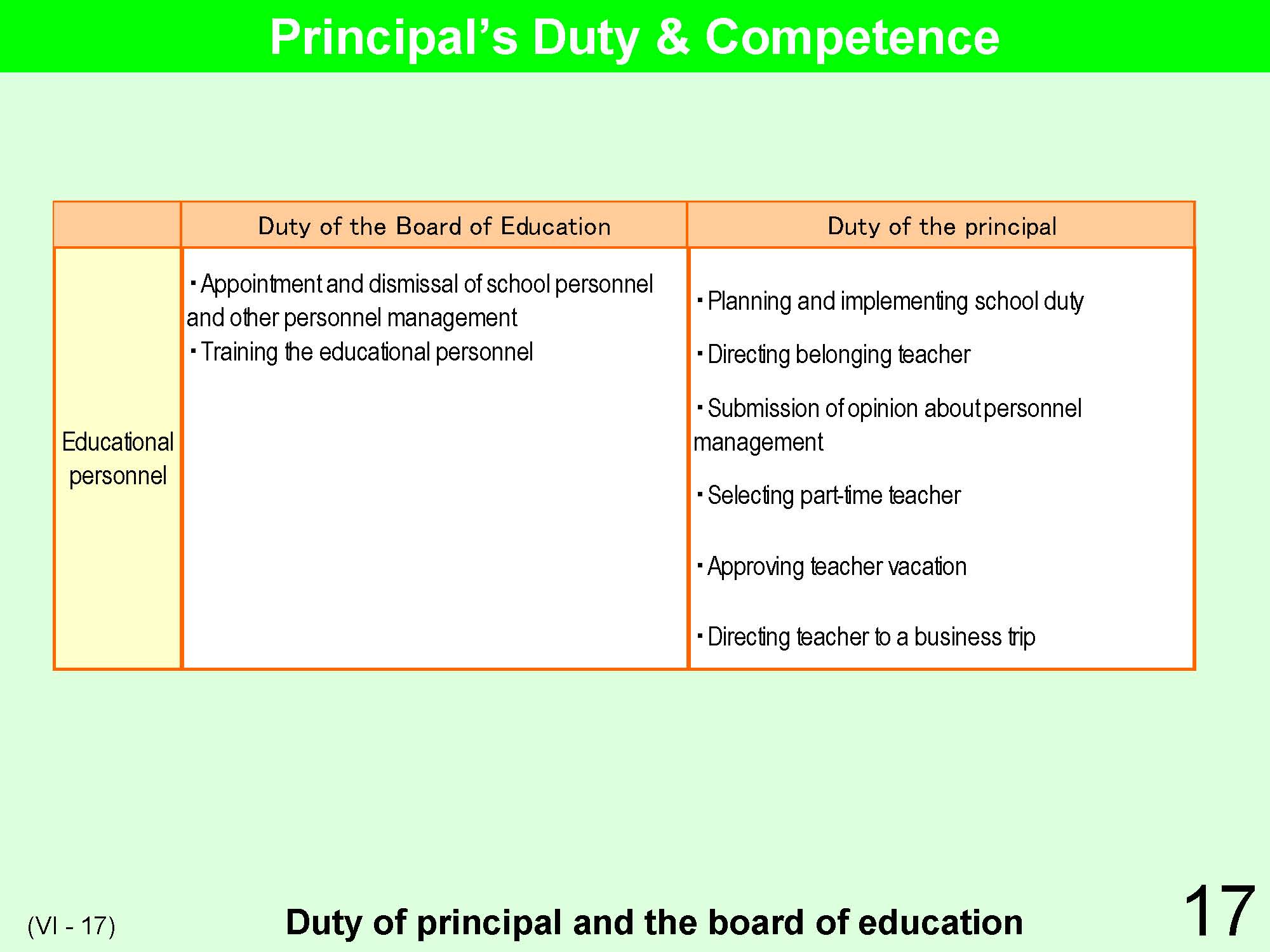 |
Today, each school seeks emphasize and focus on curricular activities. Schools now have greater local discretion, and local communities are more involved in school management than before. Elevating and upgrading the qualifications required of school principals as school leaders is also a current issue. School leaders who have the capacity to manage school are needed in order to achieve educational goals of individual schools as well as to develop educational activities efficiently by considering alternative options for changes in and out of schools. (School Leader-->VIII 29-31) |
| 18 |  |
Qualifications for conventional principal ● Advanced class certificate of a teacher or first class certificate (upper secondary school and lower secondary school principals need advanced class certificates) ● More than 5 years of “education-related job” experience. It is necessary to fulfil both requirements above. These regulations were revised in 2000, eliminating the necessity of a teaching certificate from the qualification. The two types of cases that a citizen will be accepted as a principal without a teaching certificate are as follow: ● More than 10 years of “education-related job” experience (Article 20, Clause 2) ● “If there is a particular need for improved school management,” in addition to the above requirements, “a person that is viewed as having equivalent qualities to persons who fulfil qualifications mentioned in Article 20 can be appointed or employed as principals” (Article 22) “Appointment of a citizen as the Principal” is the latter case. Appointments are made by appropriate authorities who have appointment rights. |
| 19 | 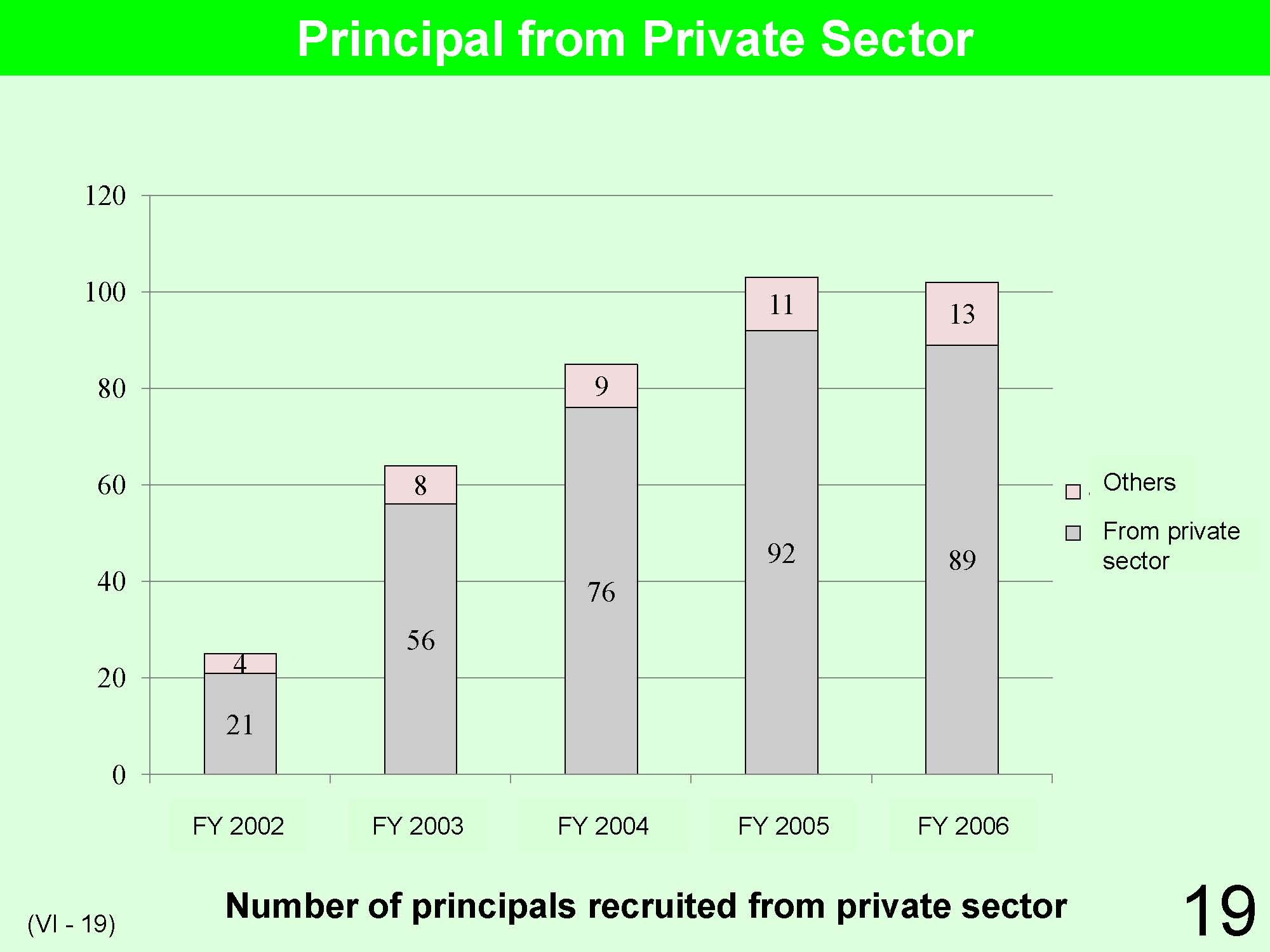 |
Though the number of persons recruited as principals (no education-related job experience) increased until 2005, it has remained at the same level since then. Even adding others who have a teaching certificate but haven’t had more than 10 years of education related job experience, the number has been just about 100 nationwide. http://www.mext.go.jp/b_menu/houdou/18/09/06092206/003/001.htm |
| 20 | 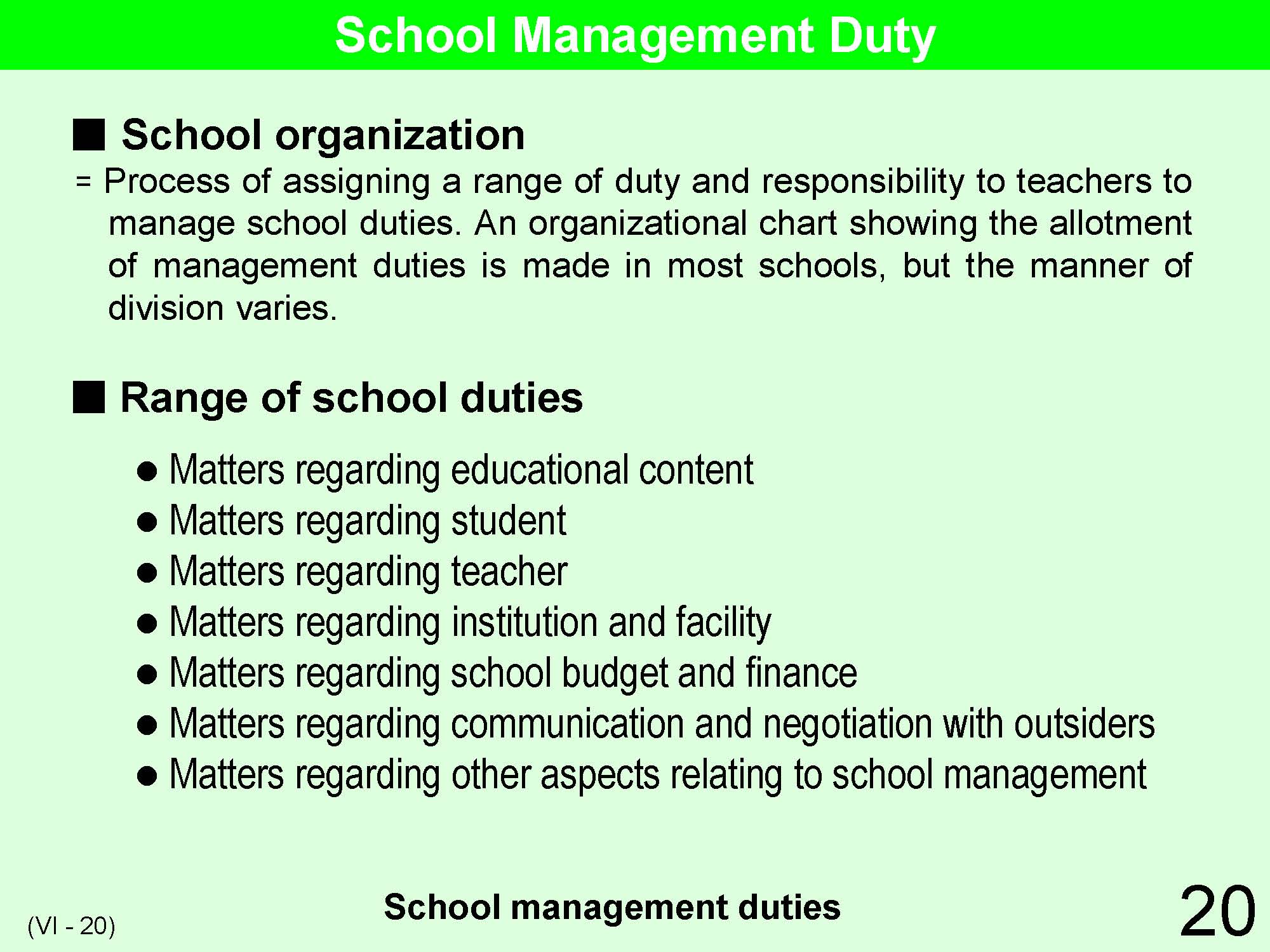 |
Duties of a principal are matters on educational contents, students, teachers, facilities and equipment, school finance, external relationships, and other stuffs relating to school management. School management duties are those where teachers take charge of some part of the school duties, with deciding types of duties and their responsibility, in order to deal with school duties. Based on that, each school makes an organizational diagram of school management duties. |
| 21 | 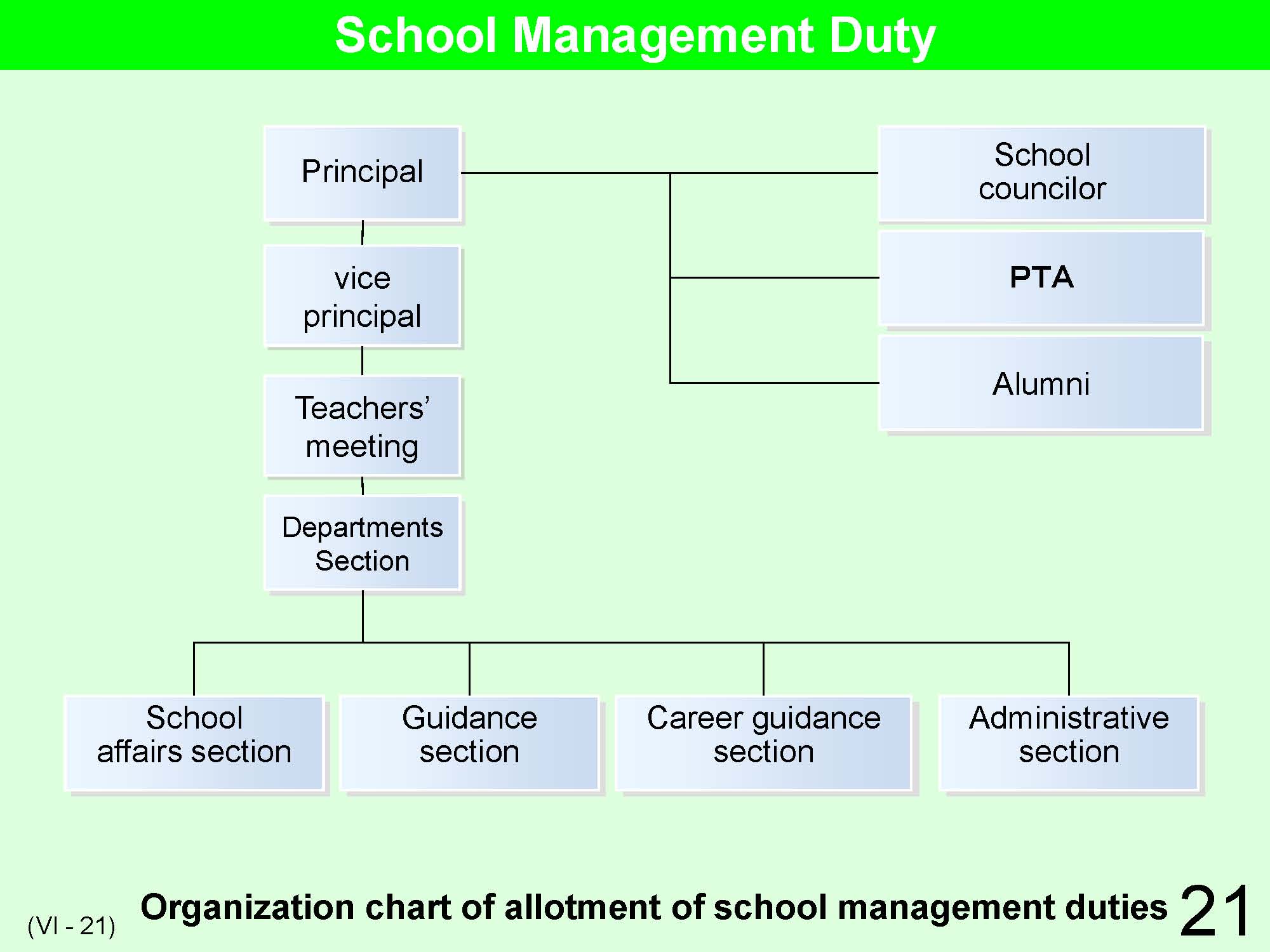 |
The organizational diagram of allotment of school management duties differs from one school to another. There are a variety of organizational structures due to differences in the number of pupils, teachers, or school personnel, educational issues and regional situations. The diagram of allotment of school management duties shows the process and system of school duties, and also the process and system of decision-making. Also, it shows the cooperation system of teachers. |
| 22 | 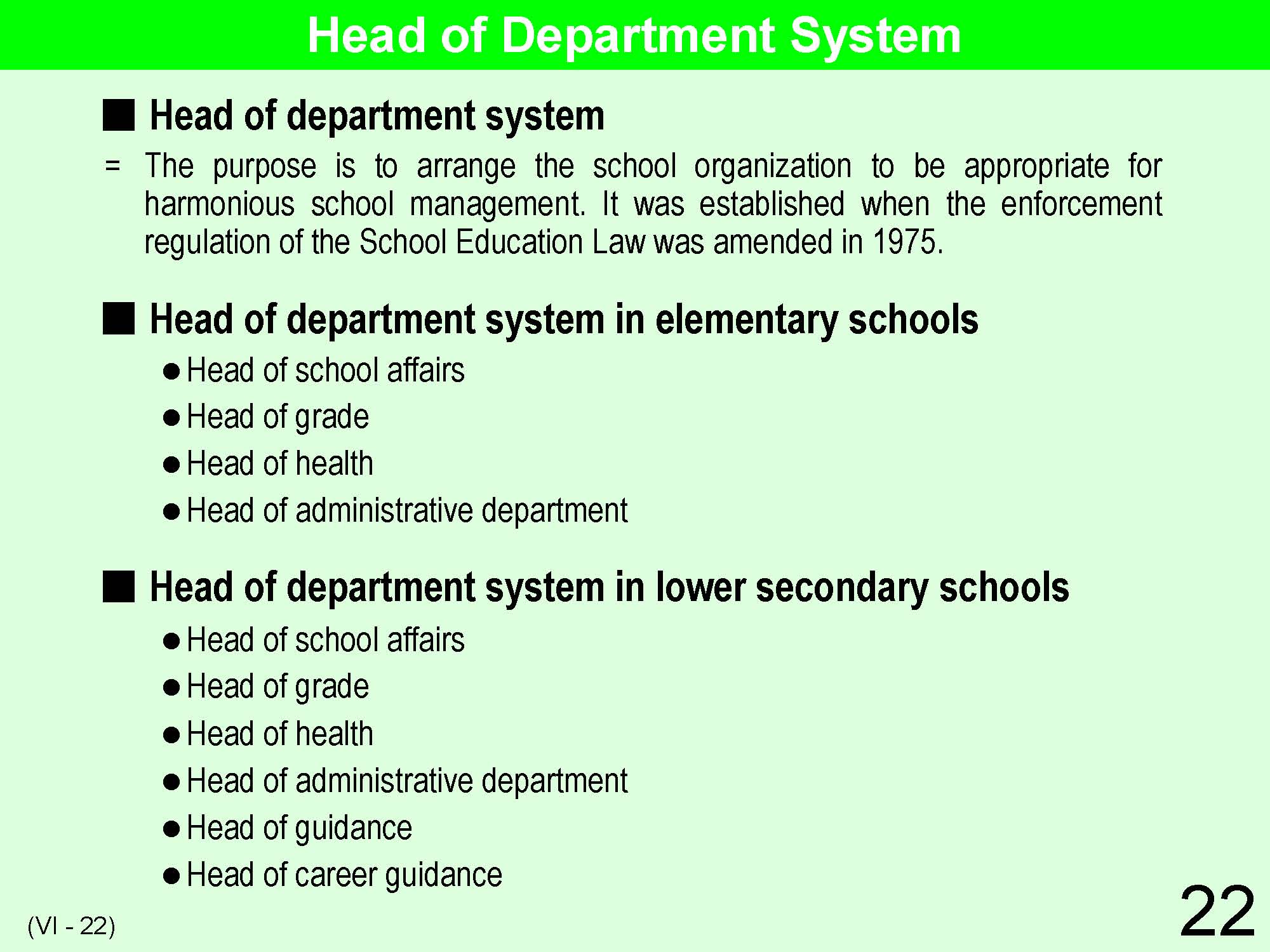 |
“Head of department system“ in school is the customary role set in the internal organization of school in order to conduct organizational functions of school efficiently and effectively. The revision of Enforcement Regulation of the School Education Act in 1975 have given the legal basis for this system. The aim of the head of department system is to carry out school management that coordinates guidance and management. Duties of a head-teacher is (1) to make plans for one's part, (2) communication and management, and (3) to guide and assist, under the order of the principal. |
| 23 | 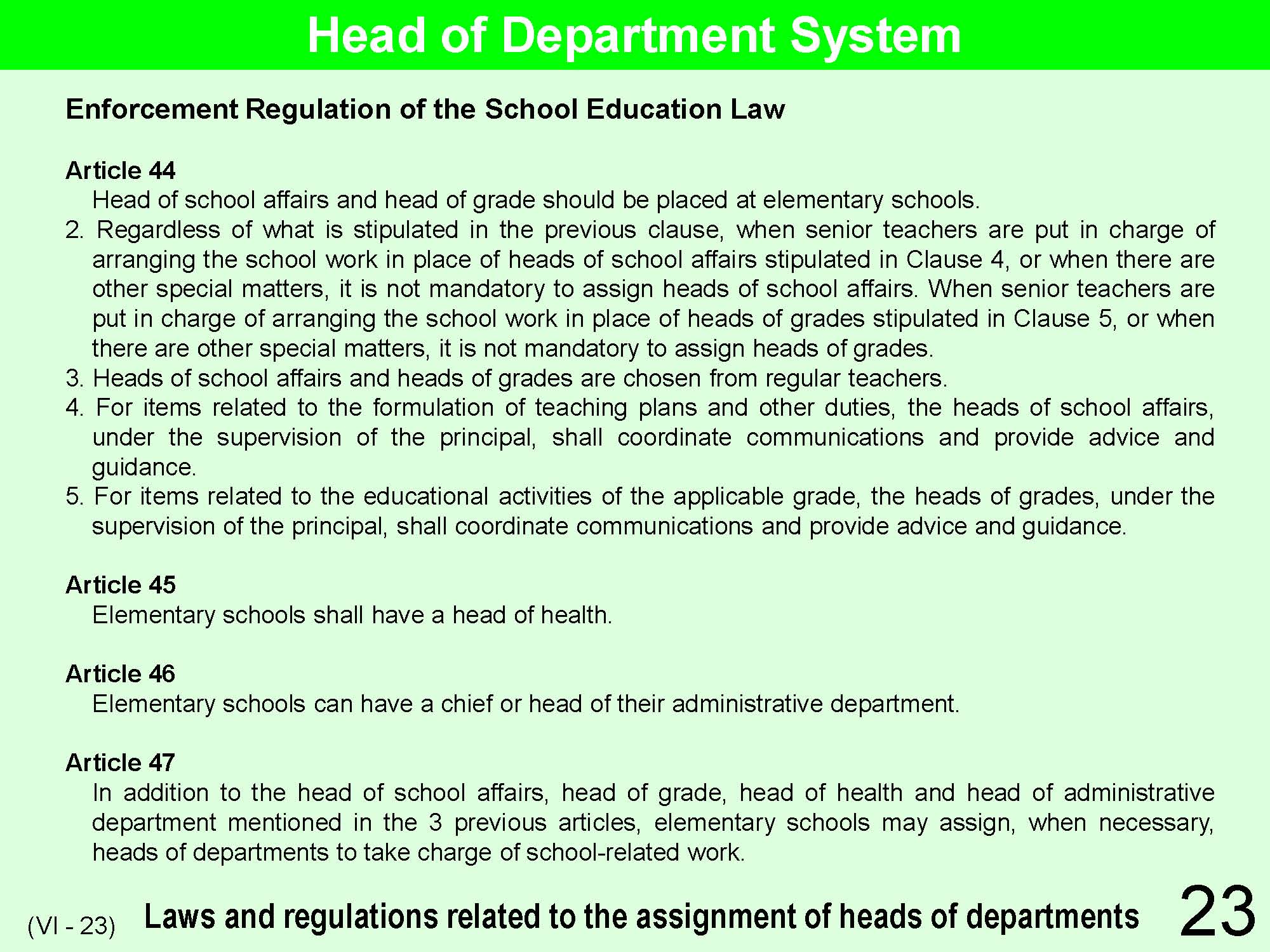 |
Duties of each head of school affairs are as: ○ Head of school affairs: to negotiate educational plans, class schedules, teaching materials with teachers; to offer training and advice to related staff. ○ Head of grade: to set management principles, plan educational activities, negotiate with and between other homeroom teachers/heads of other grades/heads of school affairs/guidance supervisor, and offer training and to provide advice to other home-room teachers. |
| 24 | 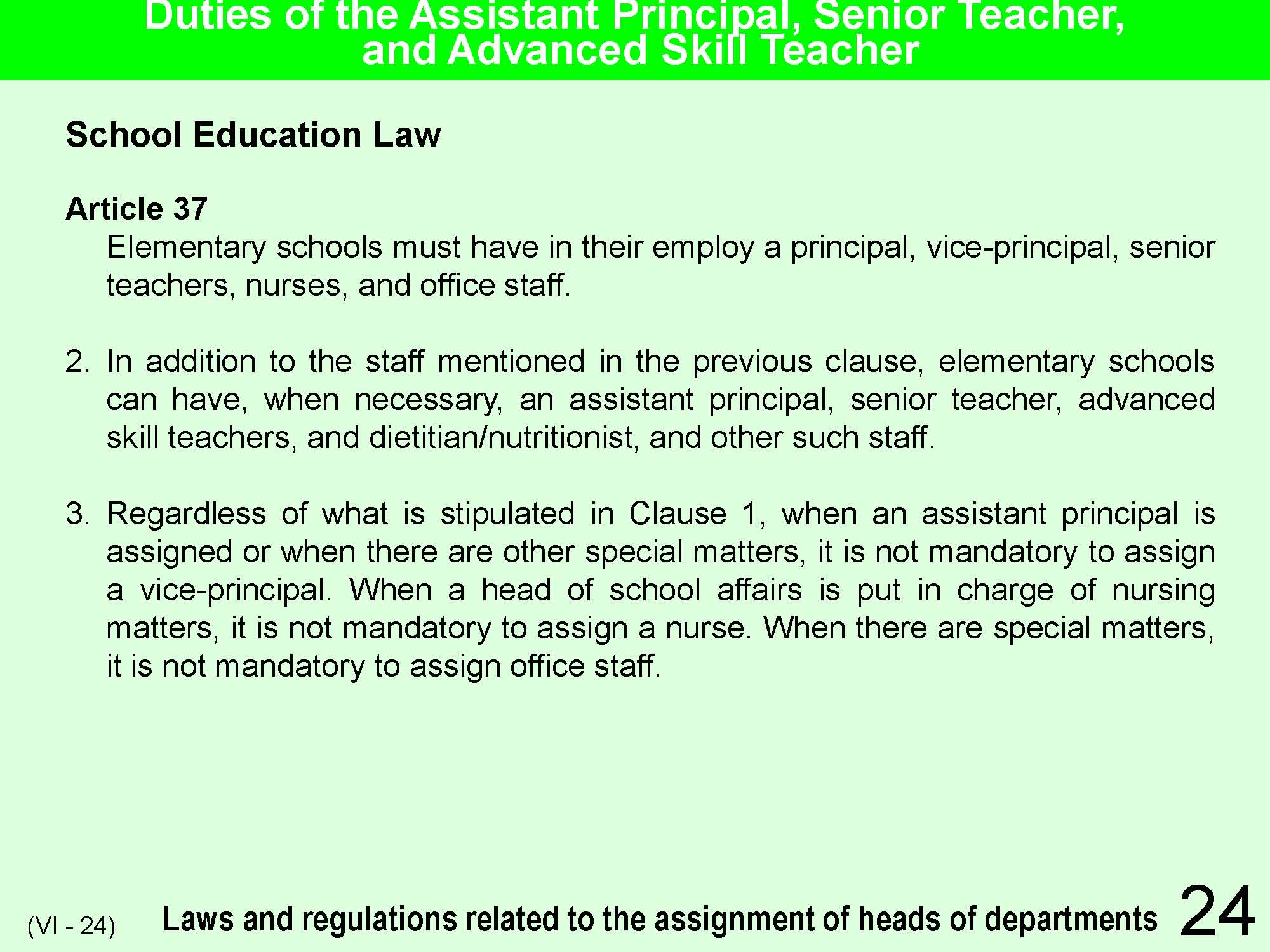 |
The revision of the School Education Law in 2007 enabled schools to have new positions such as “assistant principal,” “senior teacher,” and “advanced skill teacher.” “Assistant principal” has clearer authority as an administrative position than “vice-principal,” and “senior teacher” is placed between assistant or vice principal and teacher. “Advanced skill teacher” has a leader’s role for other teachers as to teaching skills. School organization was said to have a horizontal structure except for principals and vice principals, just like a pot lid, which didn’t allow the leadership of principals to function. Creating these positions is an attempt to provide clearer vertical structure in school organization. |
| 25 | 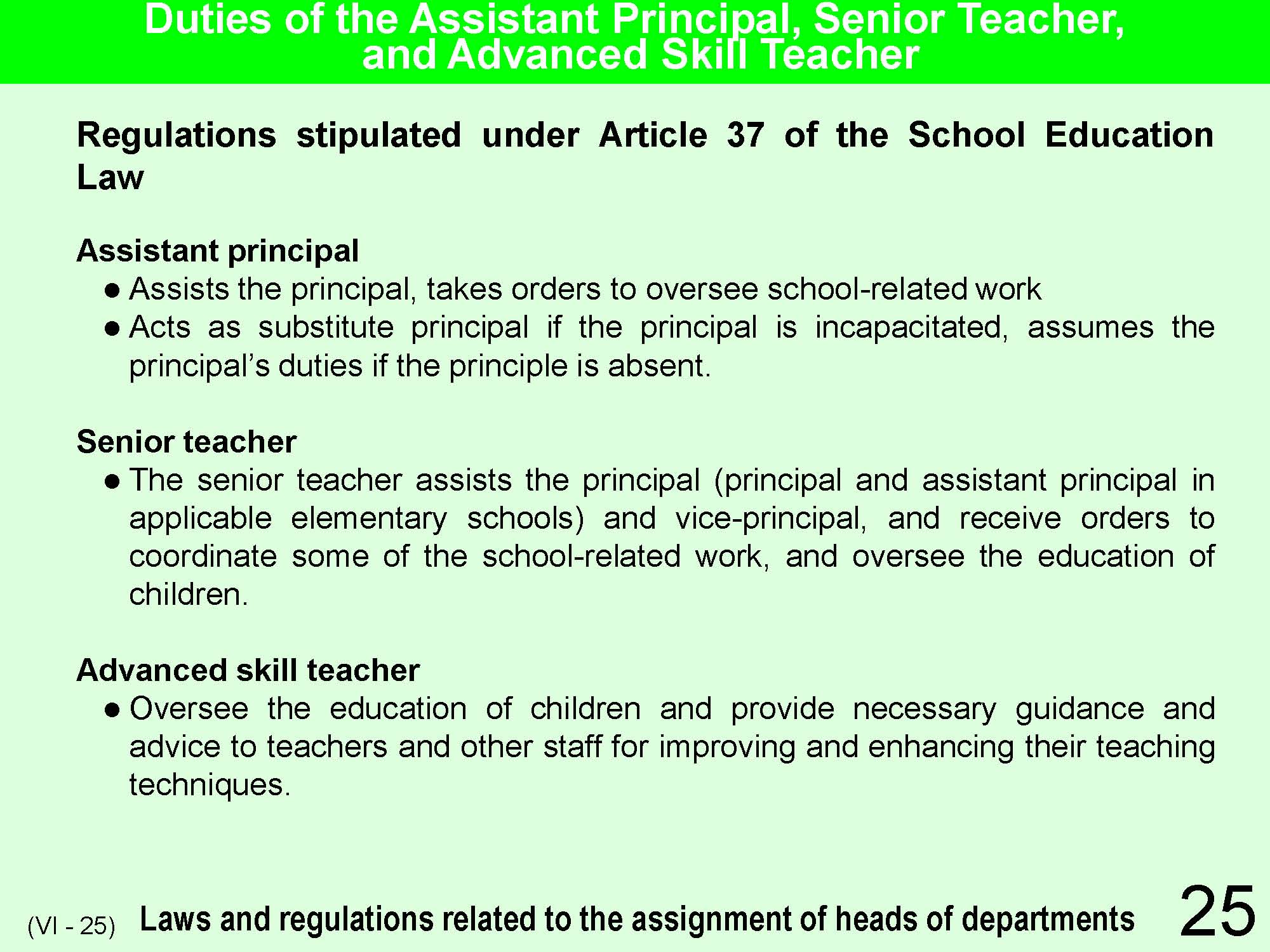 |
|
| 26 | 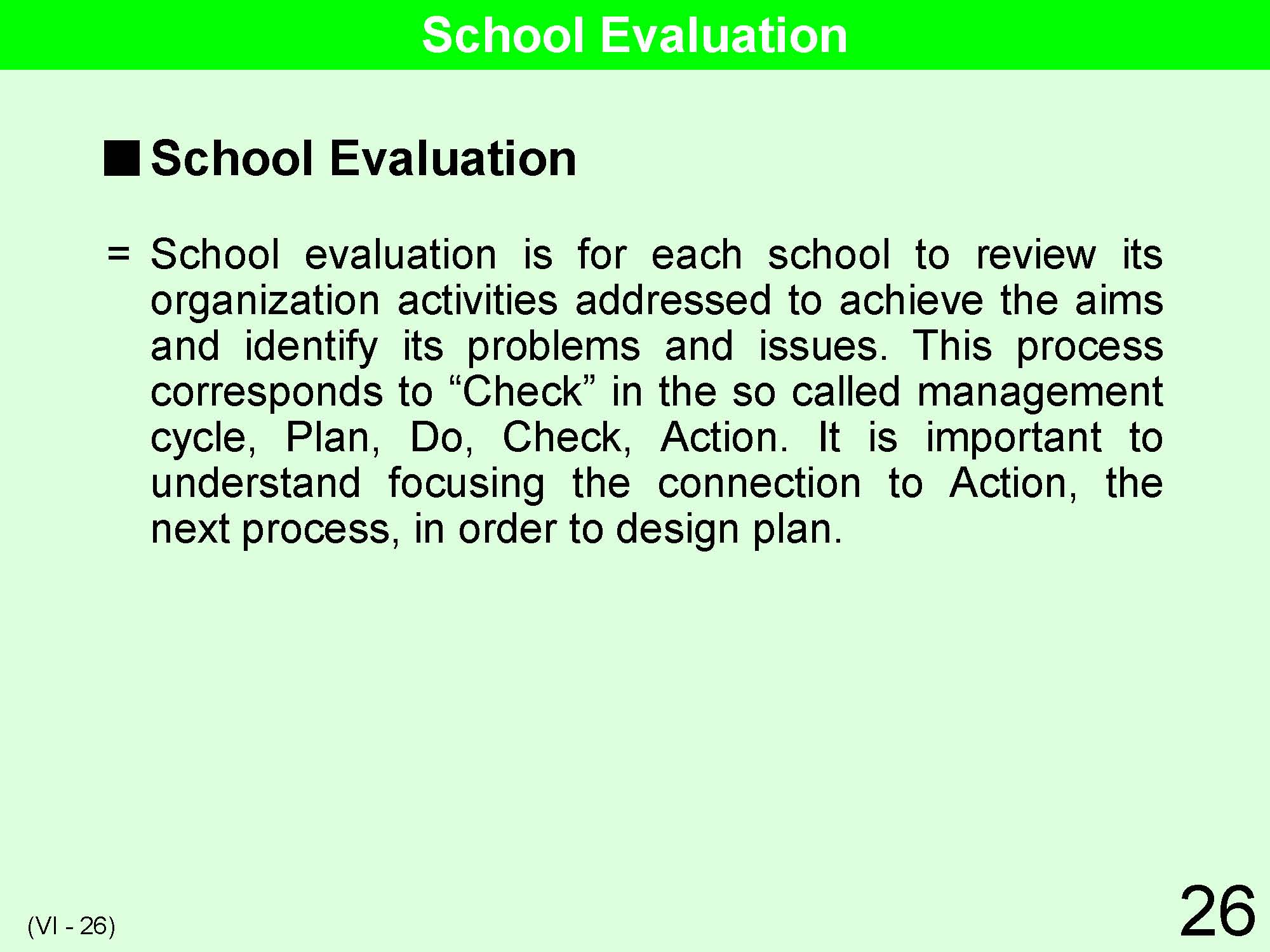 |
School evaluation is an action to review condition of education and functions in school to plan for continual improvement of educational activities. |
| 27 | 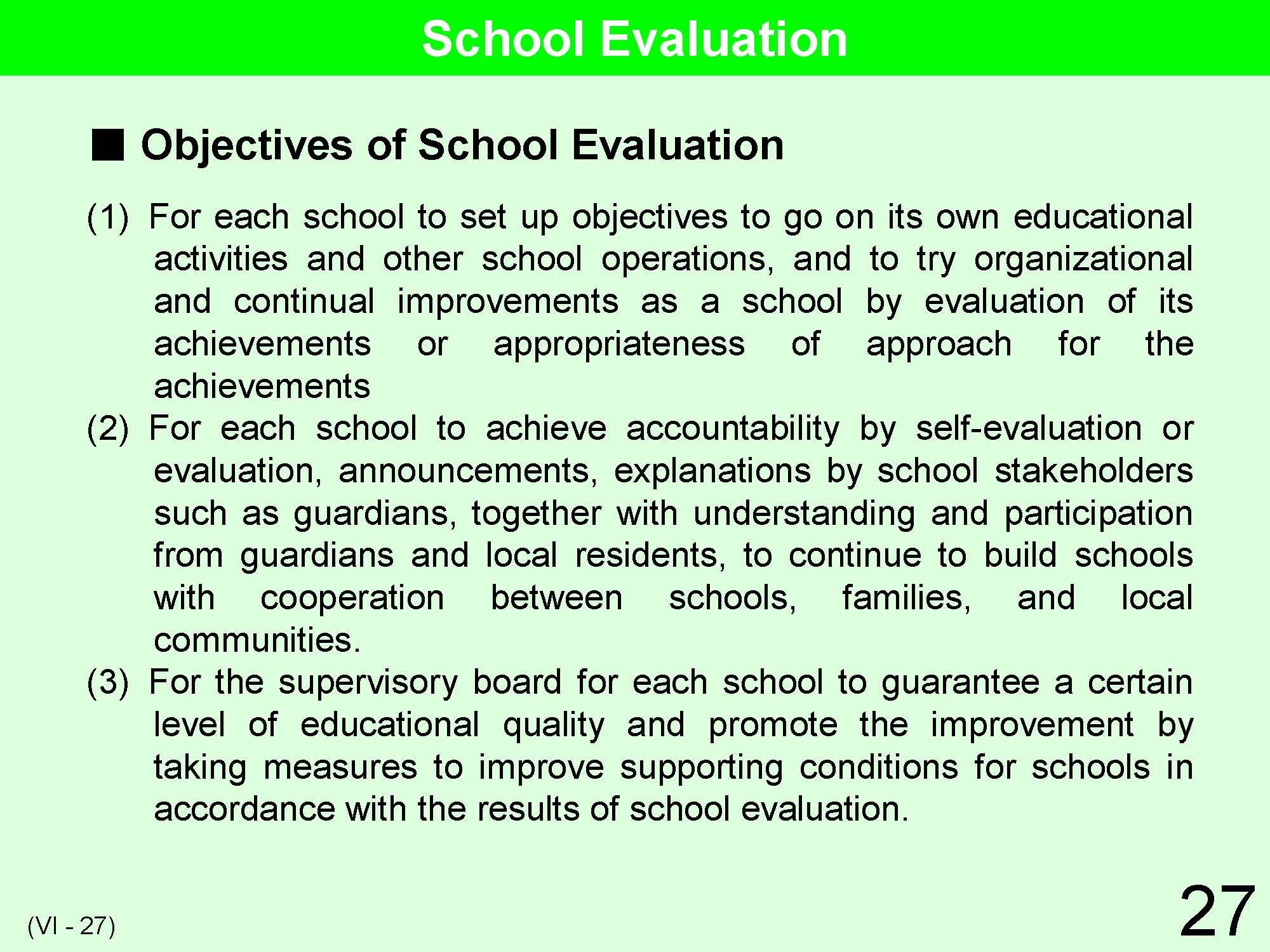 |
In revised School Evaluation Guideline (2008), three objectives for school evaluation are sorted out. For details, http://www.mext.go.jp/b_menu/houdou/20/01/08012913/001.pdf |
| 28 | 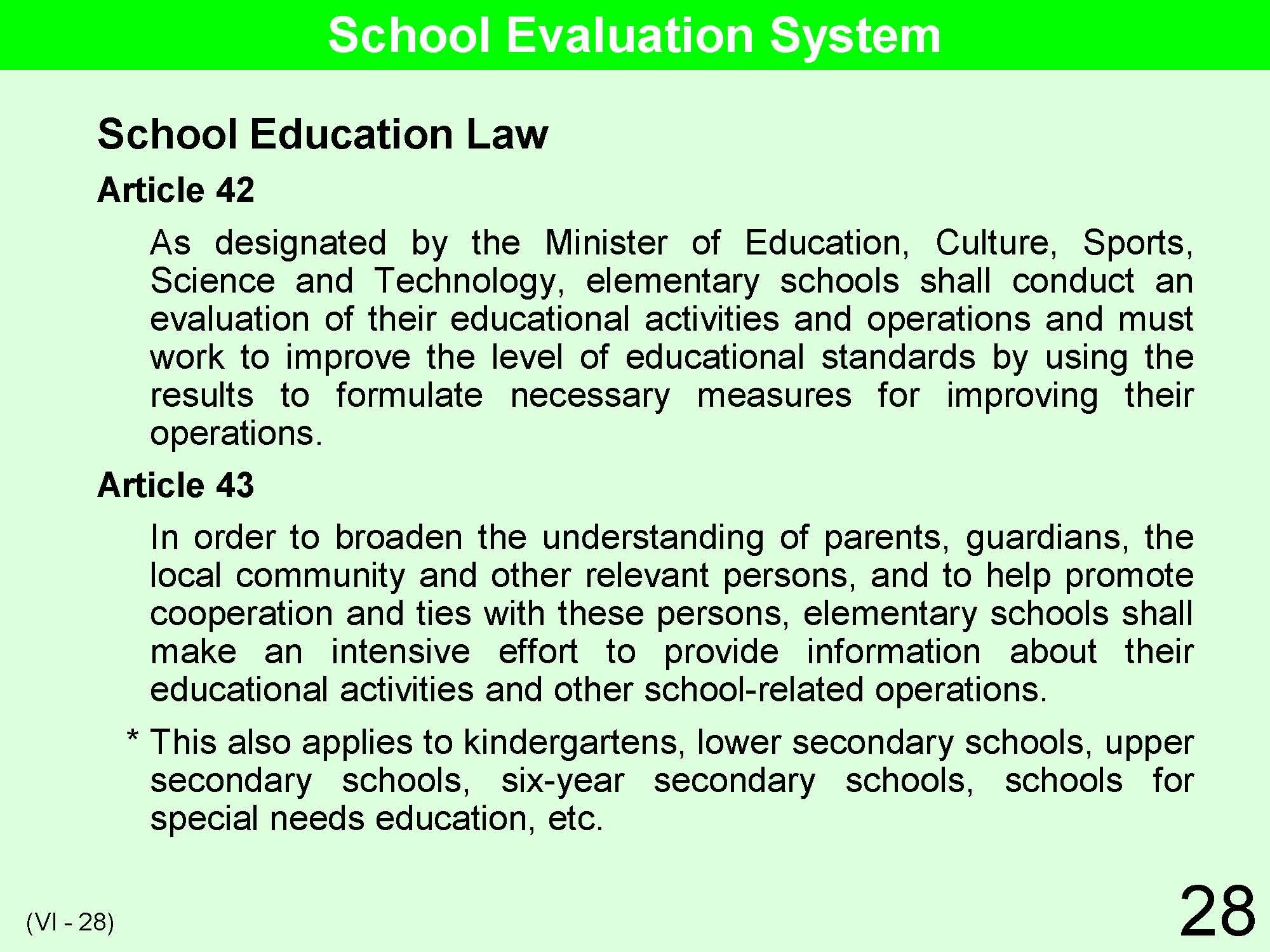 |
Due to the revision of the School Education Law in 2007, all schools are now required to evaluate the current condition of educational activities and school functions to improve school management. |
| 29 | 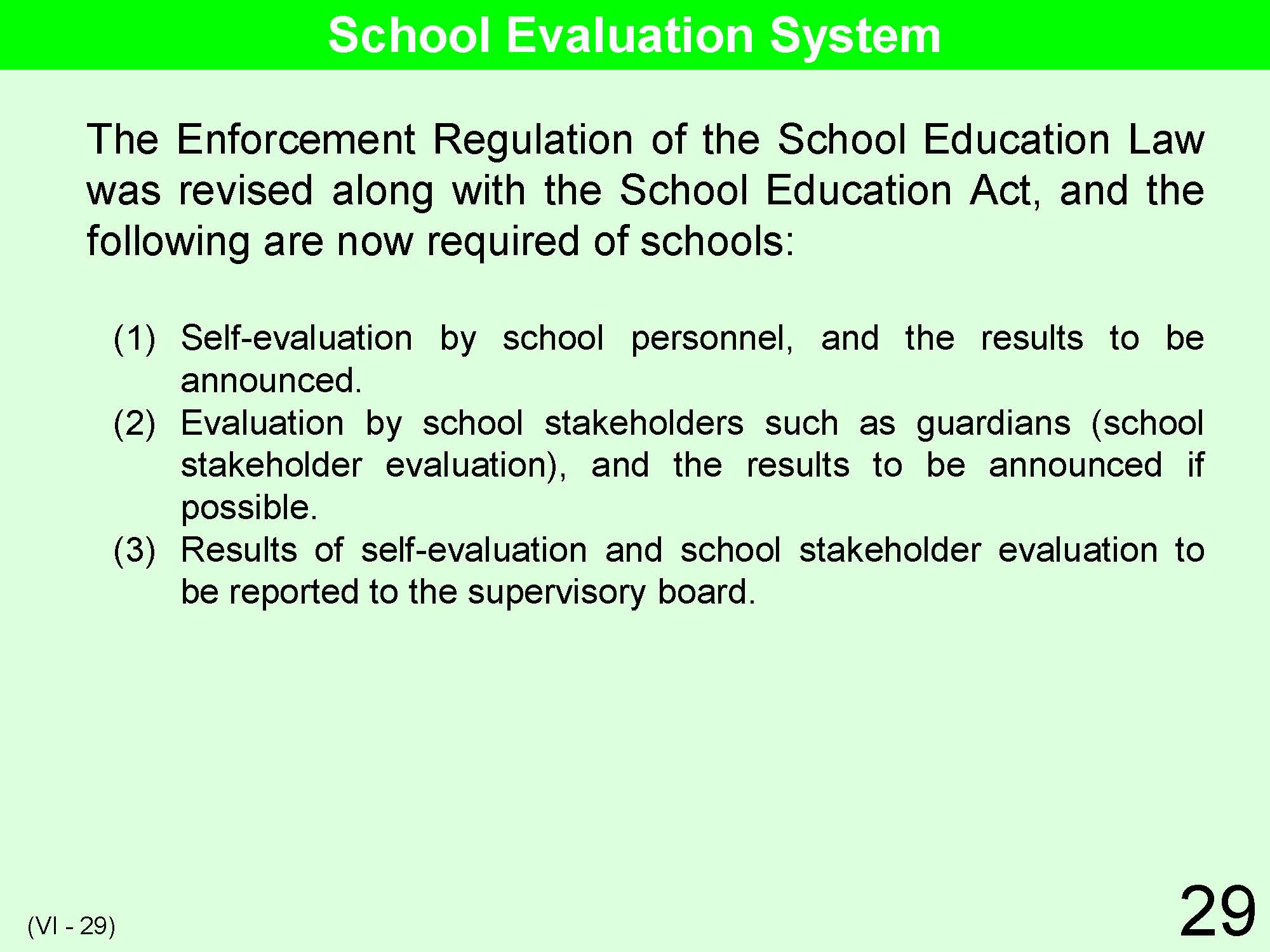 |
|
| 30 | 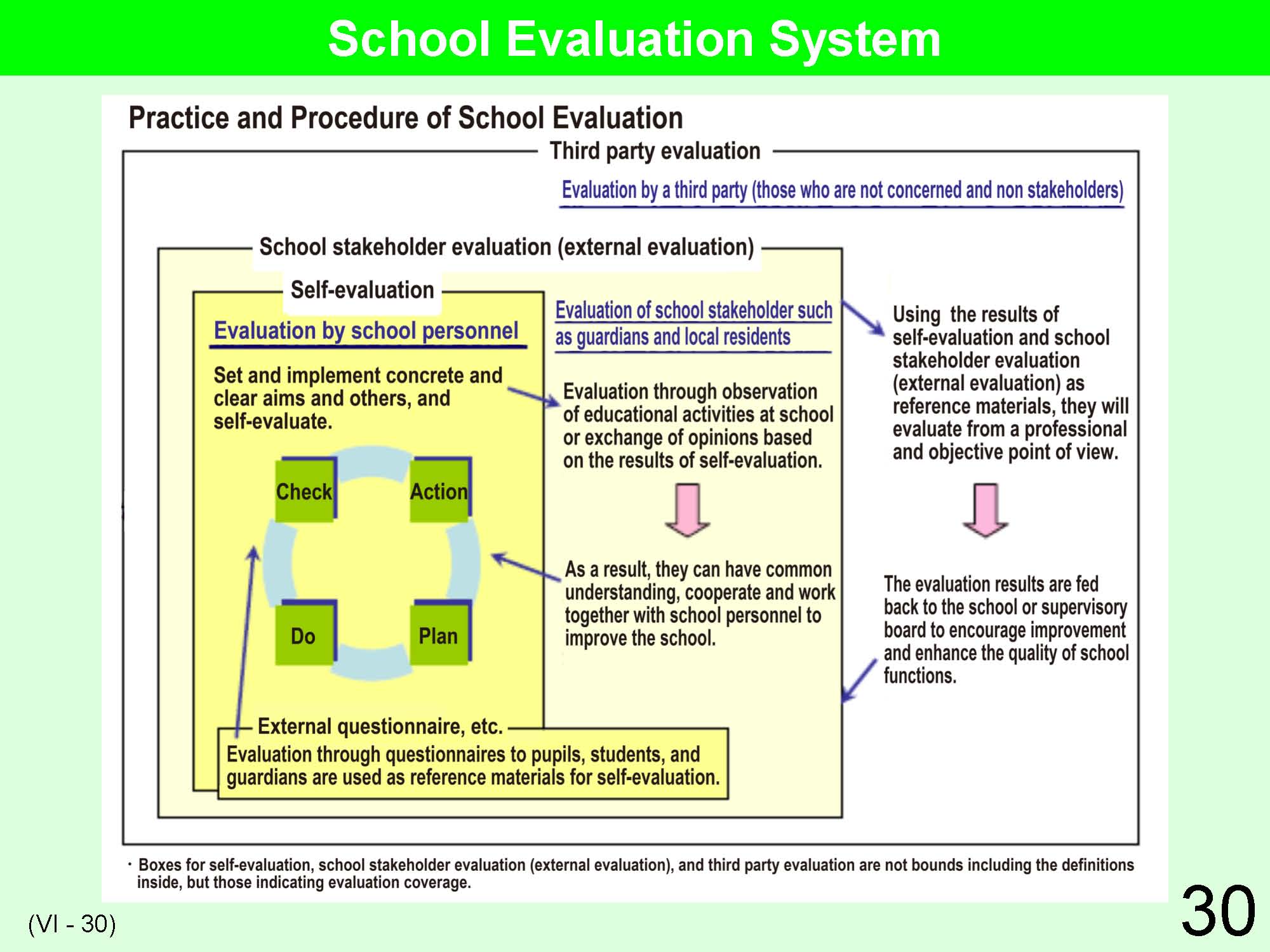 |
School evaluation system is designed in combination of “self-evaluation,” “school stakeholder evaluation,” and “third party evaluation.” http://www.mext.go.jp/b_menu/houdou/20/01/08012913/002.pdf |
| 31 | 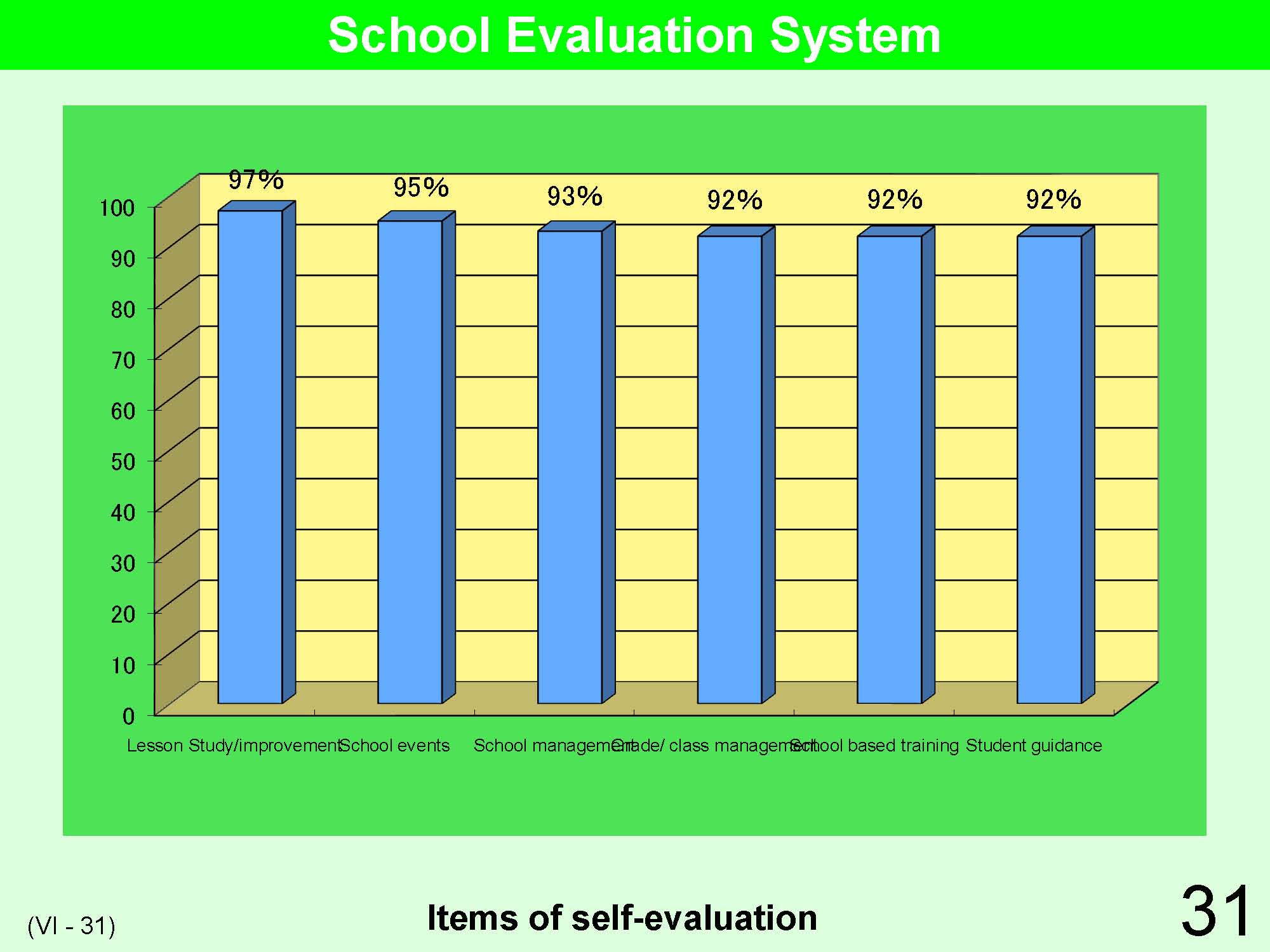 |
In conducting assessments of their schools, over 90% of schools in Japan evaluated the following items: school management, grade/class management, lesson study/improvement, school-based training/research, school events, and guidance. (http://www.mext.go.jp/b_menu/houdou/16/01/04011602/003.htm) |
| 32 | 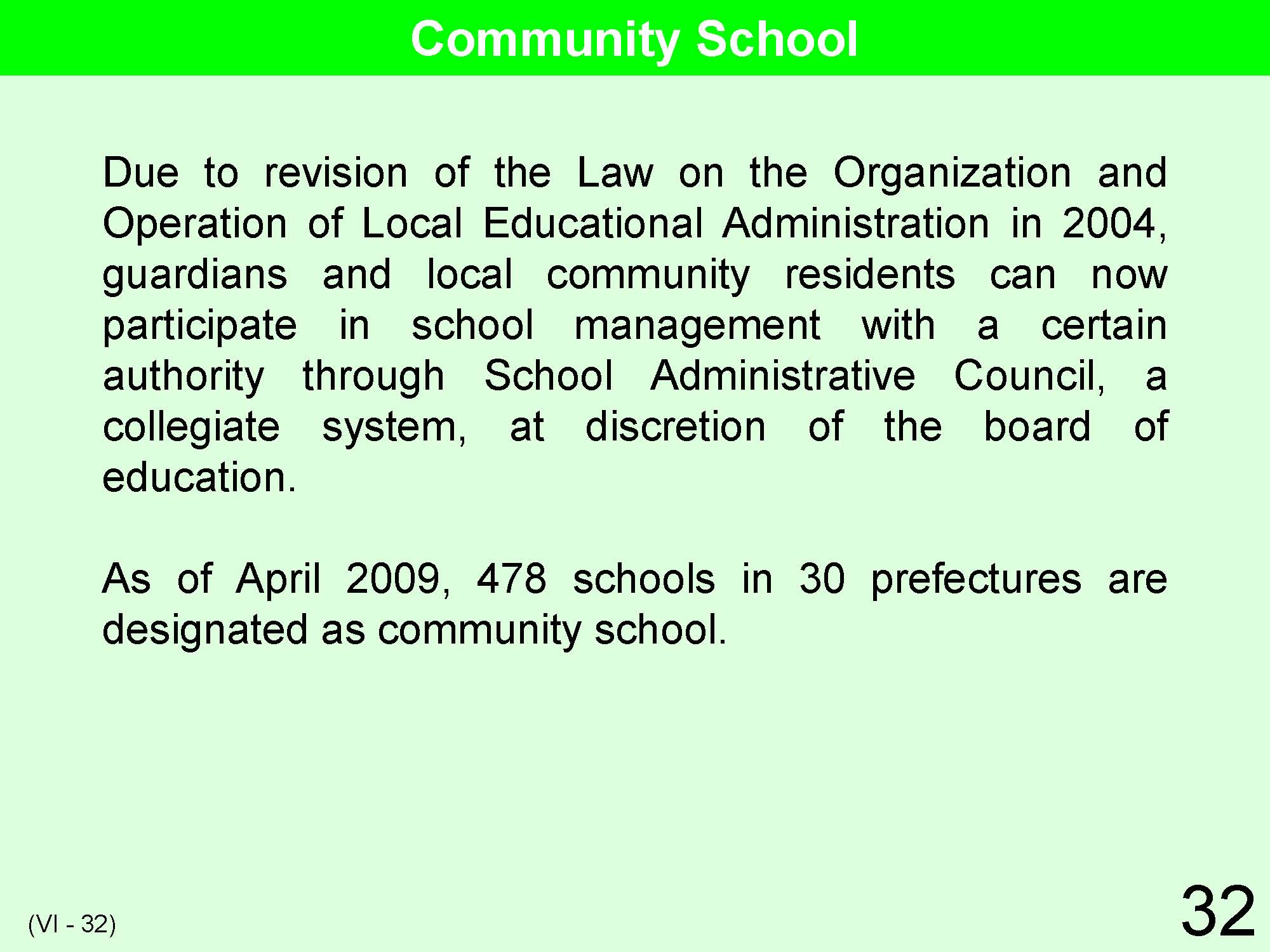 |
In June 2004, the Law on the Organization and Operation of Local Educational Administration was revised, which has enabled setting up School Administrative Council in each school and allowed guardians and local community residents to participate in school management with a certain authority. This community school system, in which local community, guardians, a board of education, and a principal share the authority and responsibility of school management, aims to realize creating school opened to and supported by the community. |
| 33 | 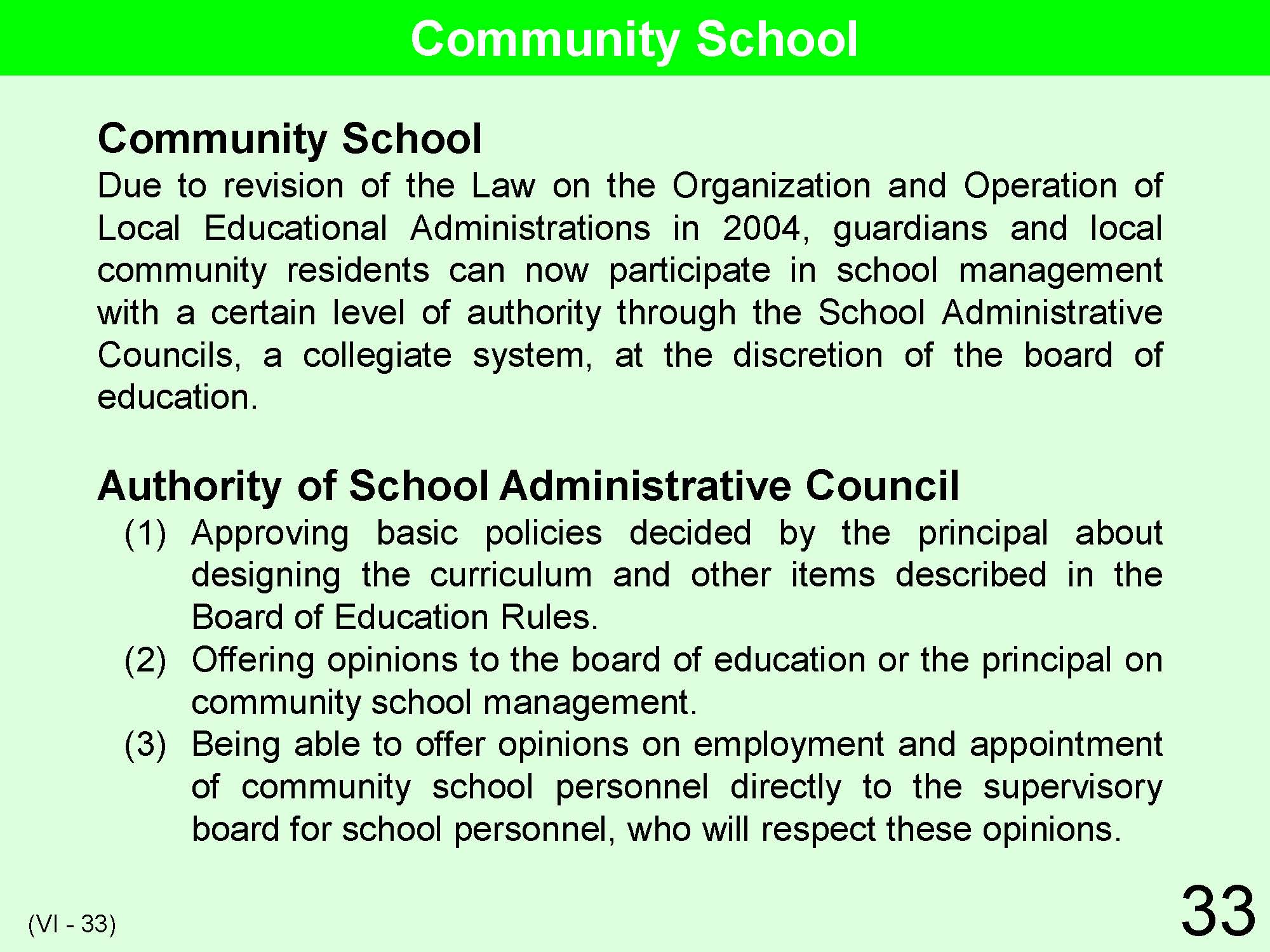 |
In June 2004, the Law on the Organization and Operation of Local Educational Administrations was revised, which has enabled setting up School Administrative Councils in each school and allowed guardians and local community residents to participate in school management with a certain level of authority. This community school system, in which the local community, guardians, the board of education, and the principal share the authority and responsibility of school management, aims to create schools open to and supported by the community. As of April 2009, 478 schools in 30 prefectures are designated as community schools. (http://www.mext.go.jp/b_menu/houdou/21/06/1279651.htm) |
| 34 | 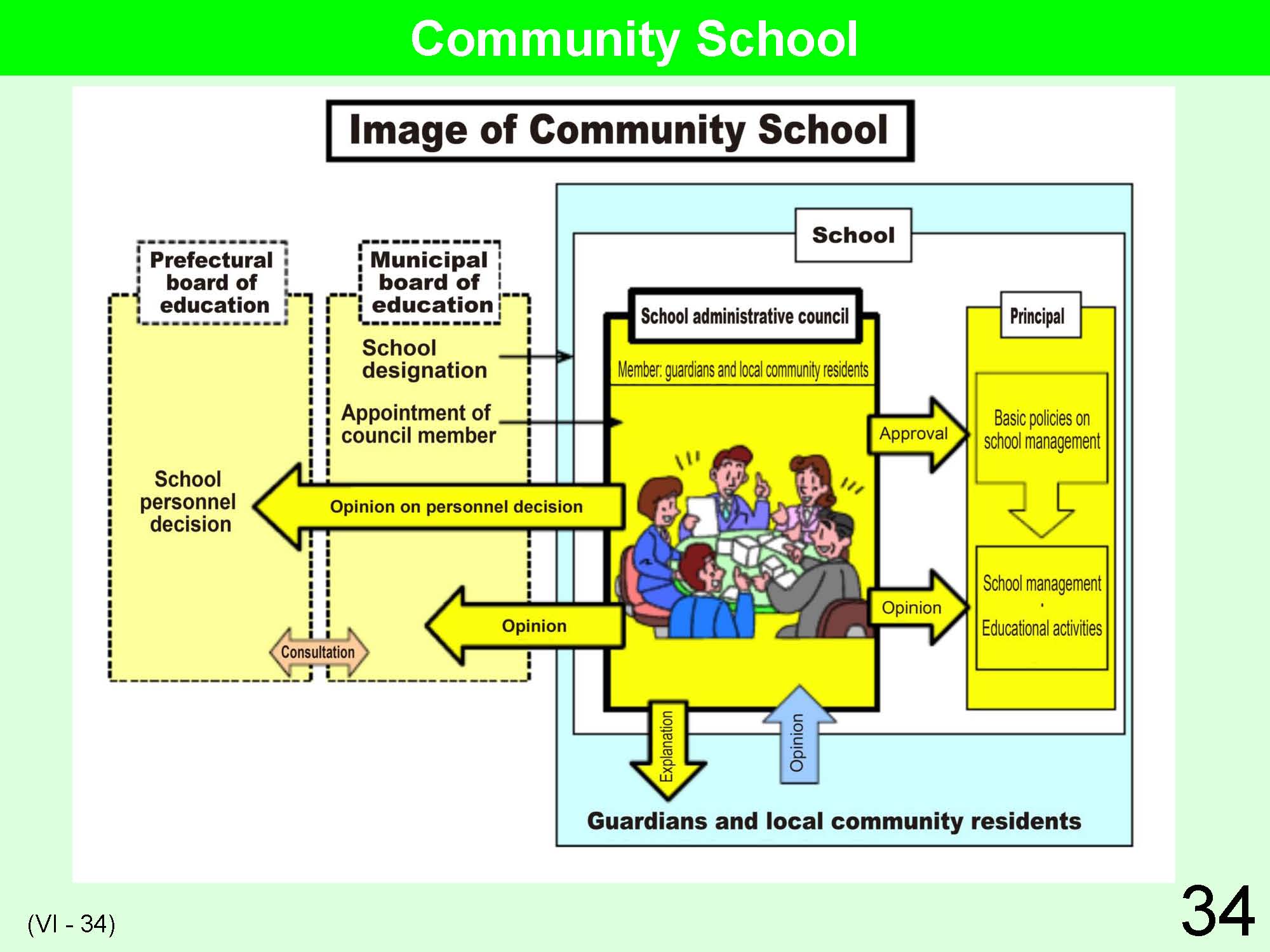 |
In June 2004, the Law on the Organization and Operation of Local Educational Administration was revised, which has enabled setting up School Administrative Councils in each school and allowed guardians and local community residents to participate in school management with a certain level of authority. This community school system, in which the local community, guardians, the board of education, and the principal share the authority and responsibility of school management, aims to create schools open to and supported by the community. http://www.mext.go.jp/a_menu/shotou/community/04122701/004/001.htm |
| 35 | 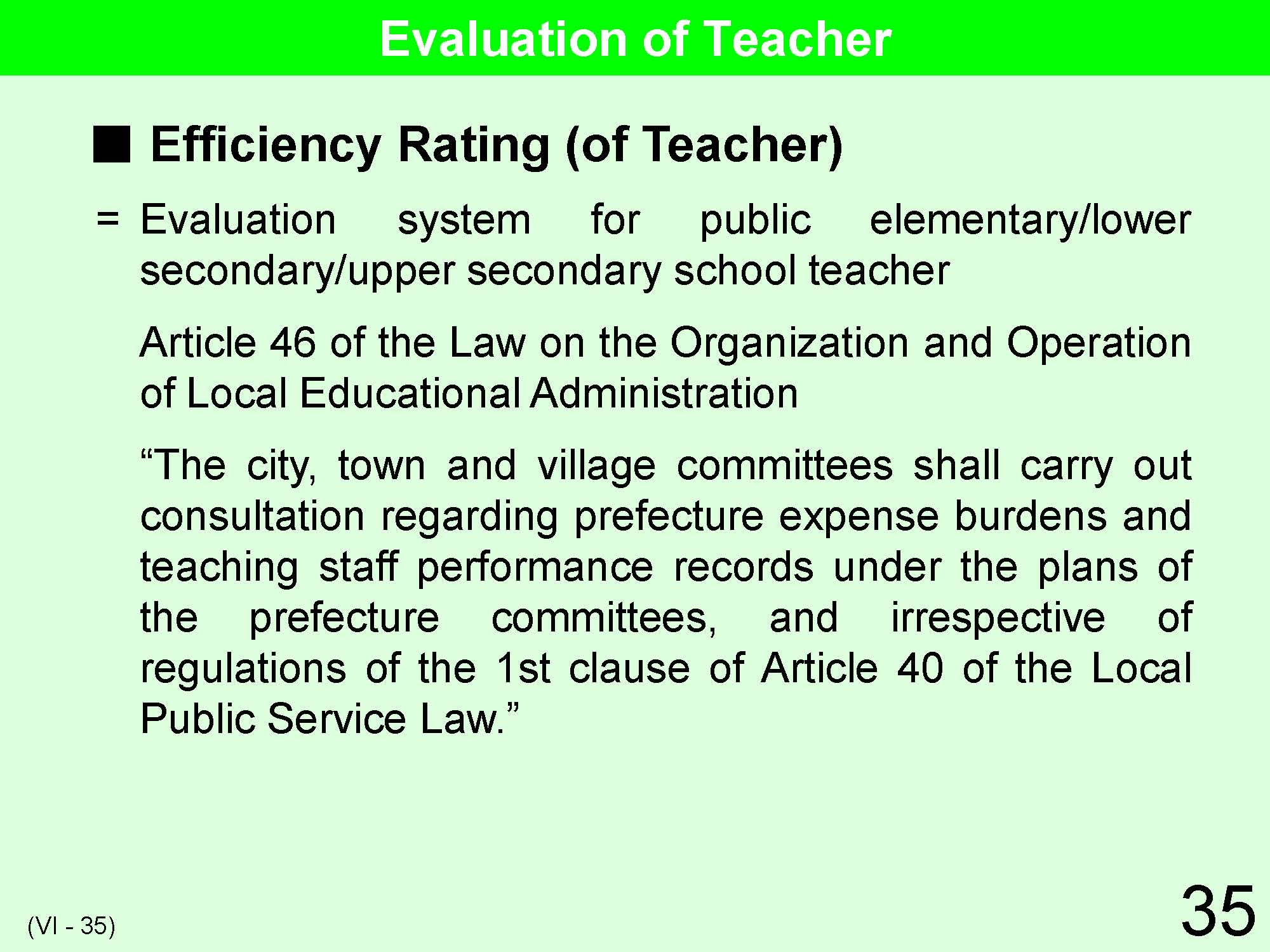 |
Outline for efficiency rating ○Types of efficiency rating: Regular, conditional, extraordinary ○Forms of efficiency rating: (1) At a local government level, the superintendents of the boards of education rate the principals (2) At a school level, the principals rate the teaching and administrative staff ○Contents of efficiency ratings:A:Efficiency grades, B: Aptitude/personality, C:Special mention, D: General comments |
| 36 | 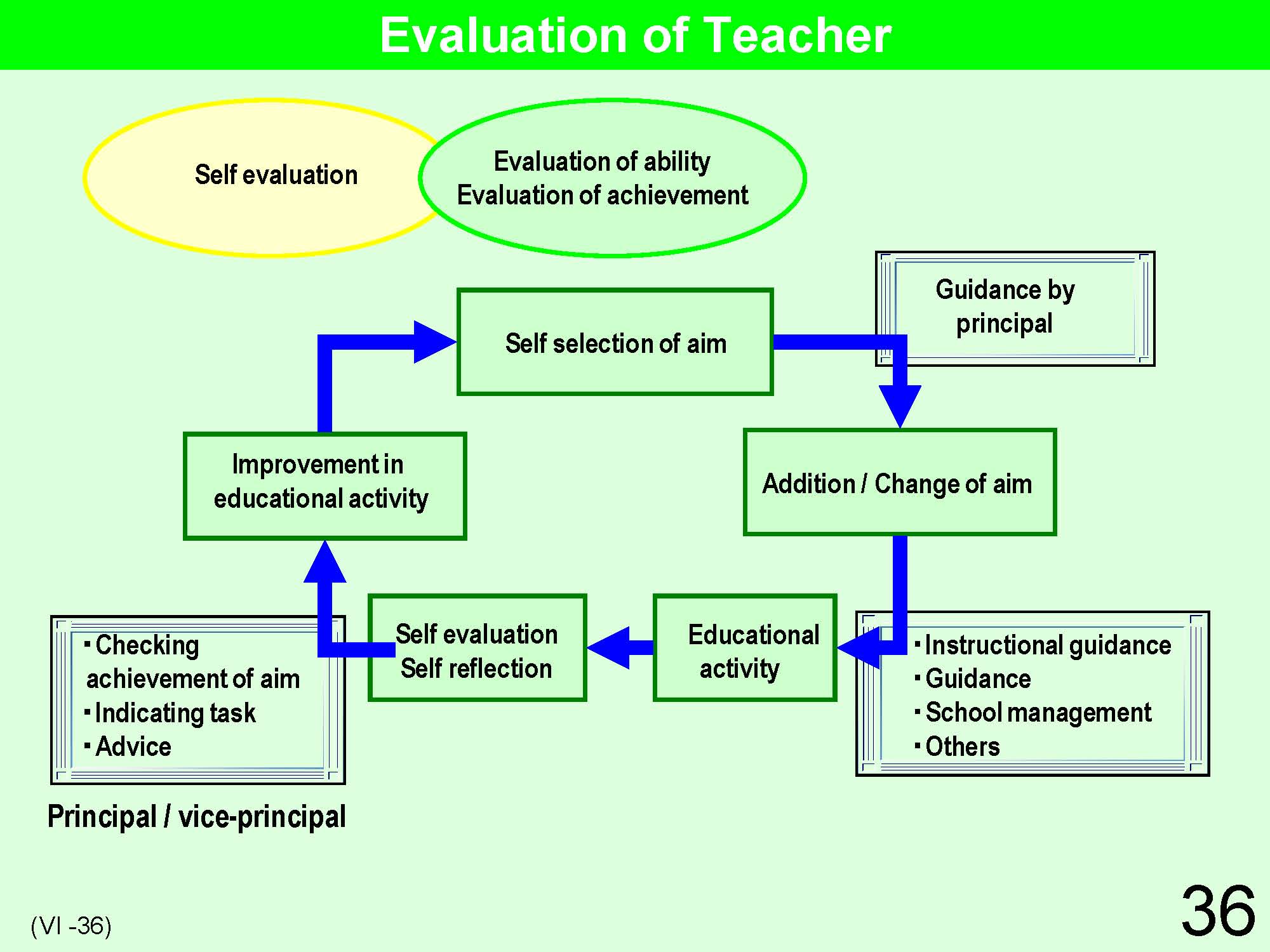 |
Today, some local government bodies have started seeking a new efficiency rating system. Especially in Tokyo, under new School Management Regulations were enacted in December 1999, and the new efficiency rating system became operational in 2000. Under the new system, individual educational personnel set their own objectives based on their principal’s educational principles. They then submit their self-evaluations about their accomplishments in relation to their objectives (self-declarations). The school principals and vice-principals examine and assess individual teachers’ performance and duty records by using absolute evaluation criteria, and then use these evaluations for advising and training the teacher. The superintendents of the boards of education also conduct a relative (comparative) evaluation to be factored into recommendations for promotion. |
| 37 | 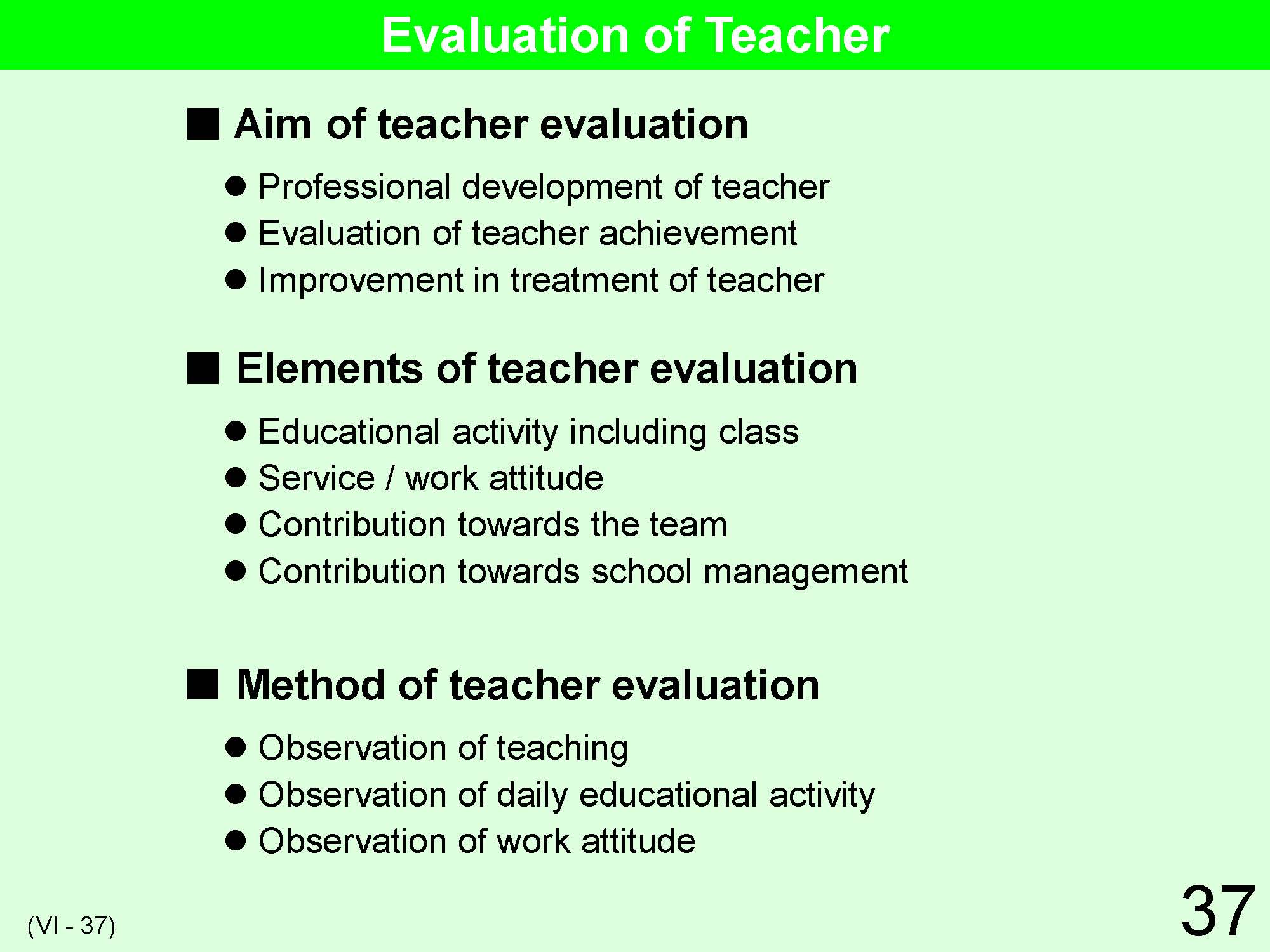 |
School management regulations in Tokyo prefectures state, Article 2. Efficiency ratings are conducted by self-declarations and achievement evaluations Article 3. Efficiency ratings must be done by all staff except for persons appointed by the superintendents of the boards of education in Tokyo. Article 4. Self-declarations are basically done on April 1st, October 1st, March 31st. (Types of achievement evaluation) Article 5. Types of achievement evaluations consist of a regular evaluation and a special evaluation. |
| 38 | 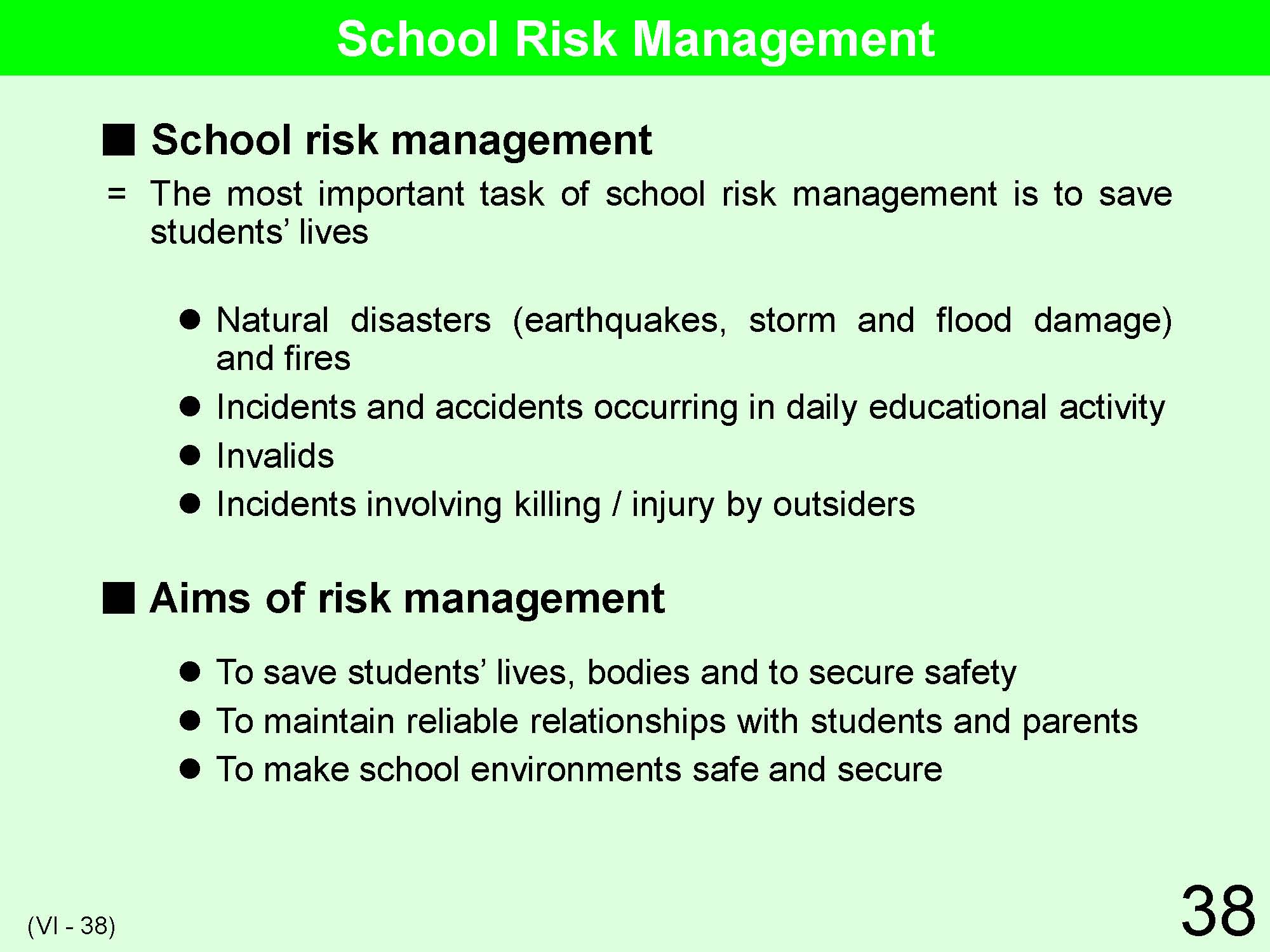 |
There are many risks of natural disasters such as earthquakes and typhoons potentially encountered by students and schools as well as other risks that may occur during school activities and school management. Therefore it is responsibility of schools to ensure the safety of their students. In order to do this, various risks must be assessed, reactions must be anticipated and training in safety management conducted. |
| 39 | 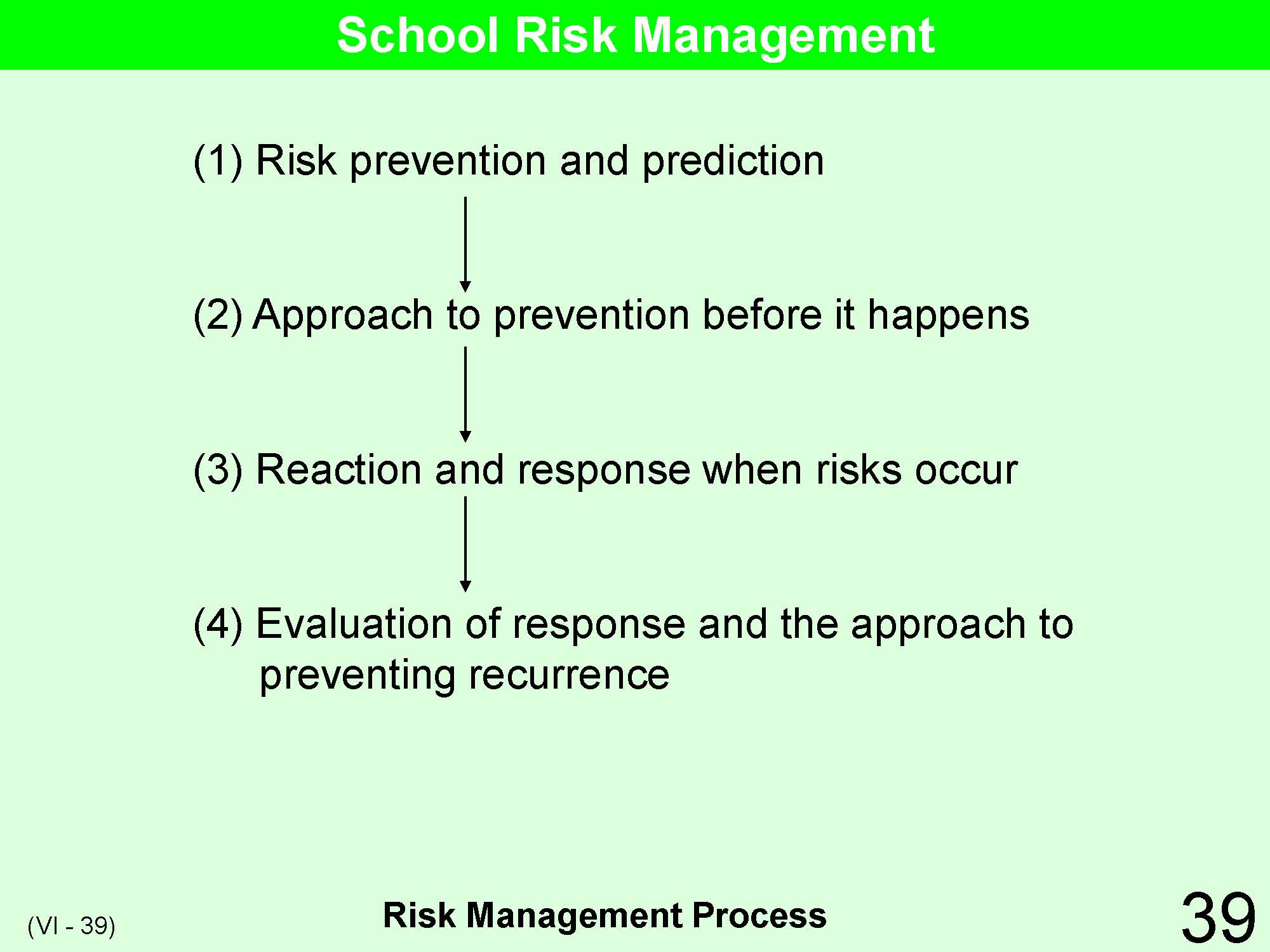 |
Because the number of crimes occurring at schools is increasing, MEXT published “School Safety Emergency Appeal - to secure safety of children” (January 20, 2004). As “Practical important guidelines on school safety,” [ Important points on practical approaches by schools ] [ Important points on practical approaches by establishers ] [ Cooperation with communities ] [ Cooperation with related organizations / groups within communities ] |
| 40 | 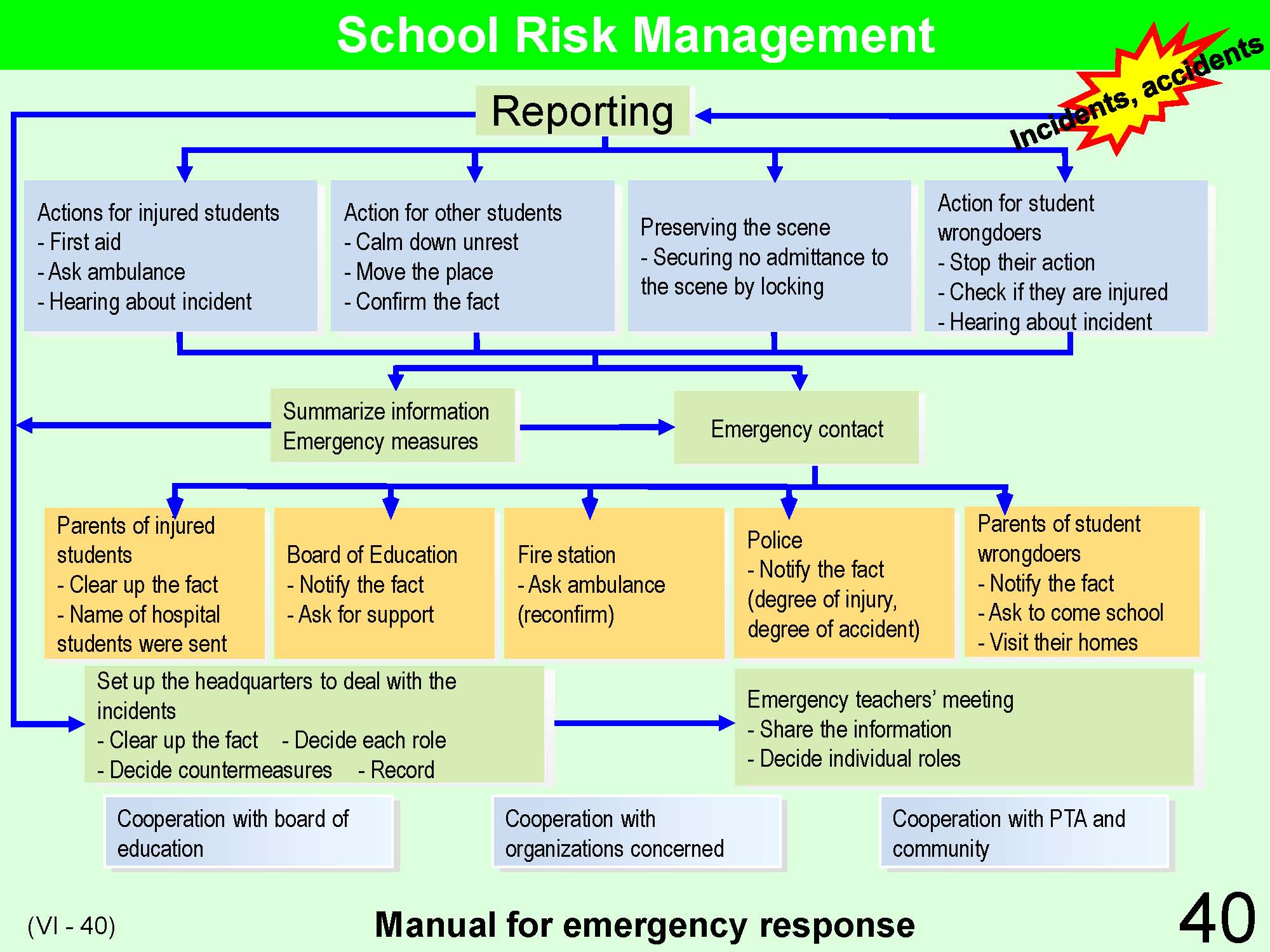 |
|
| 41 | 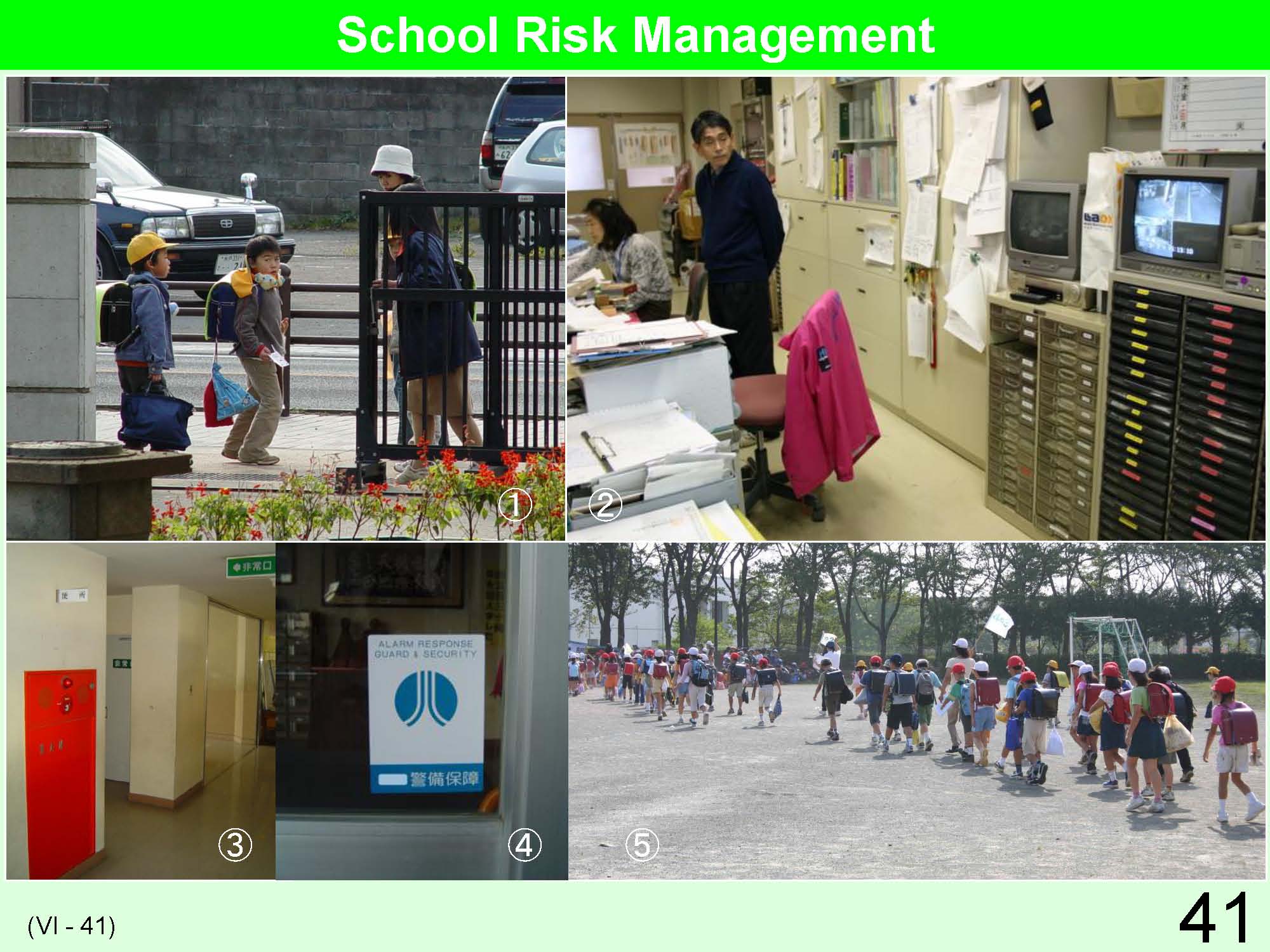 |
(1) December 2003 (2) March 2005 (3) Hydrant and emergency exit (4) Security company (5) September 2004 (Disaster drill -->IX 12) |
| 42 | 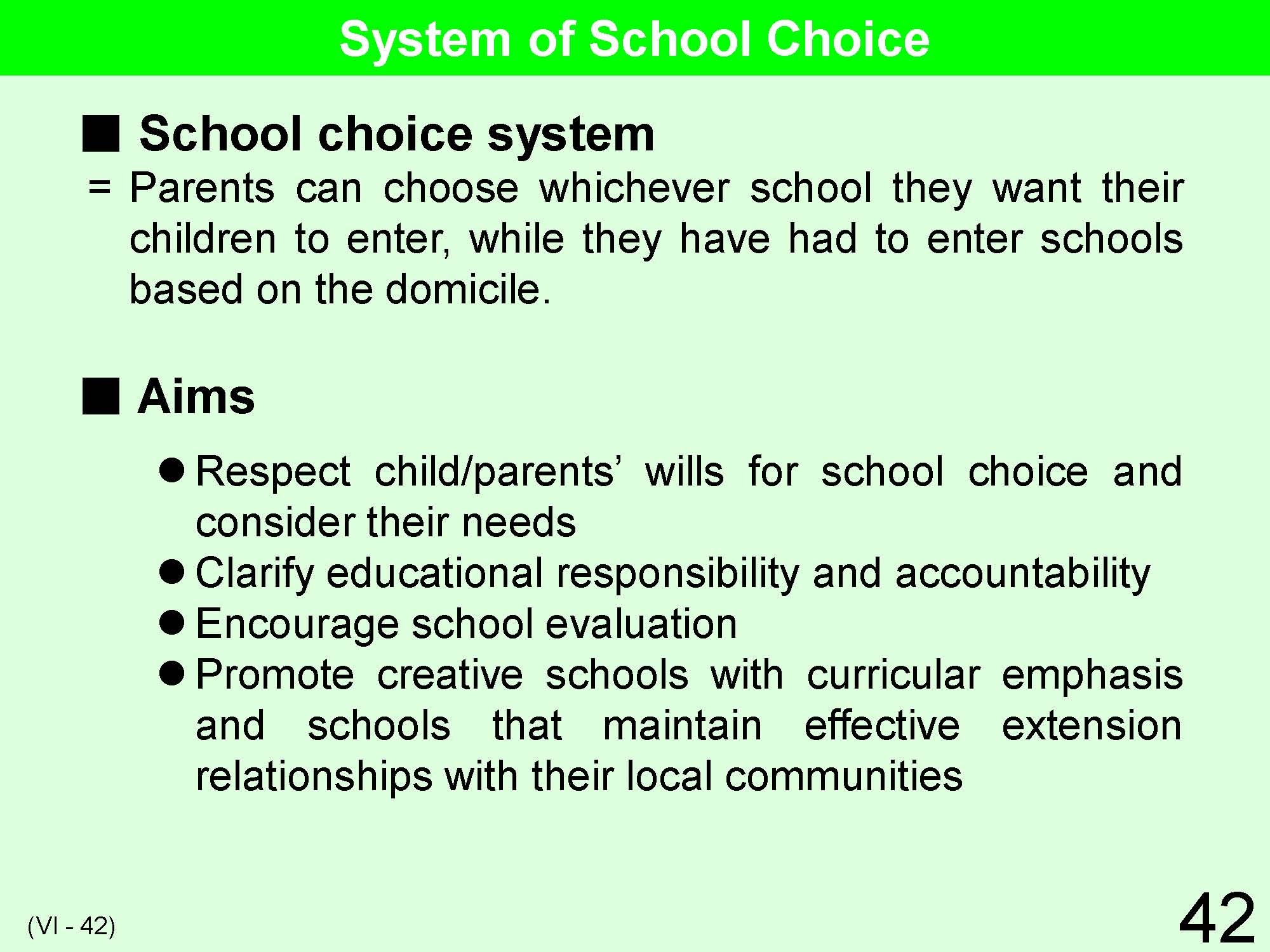 |
The Japanese school choice system was proposed by the National Task Force for Educational Reform third report (1987) and “Promotion of Deregulation for Creative Human Development (second)” (1996) etc., MEXT (Ministry of Education, Culture, Sports, Science and Technology) notified the superintendents of each prefectural board of education about the flexibility of school choice in School Districts in 1997, and requested the municipal boards of education to notify parents and local communities. MEXT requested that: (1) Each municipal board of education must consider parental needs (2) Switching schools and attending schools in a different district is permitted based on parental statements (3) Each municipal board of education must distribute the information about school districts and the school choice system, and then prepare an accompanying consulting system to be made available for use by schools, parents of students and communities |
| 43 | 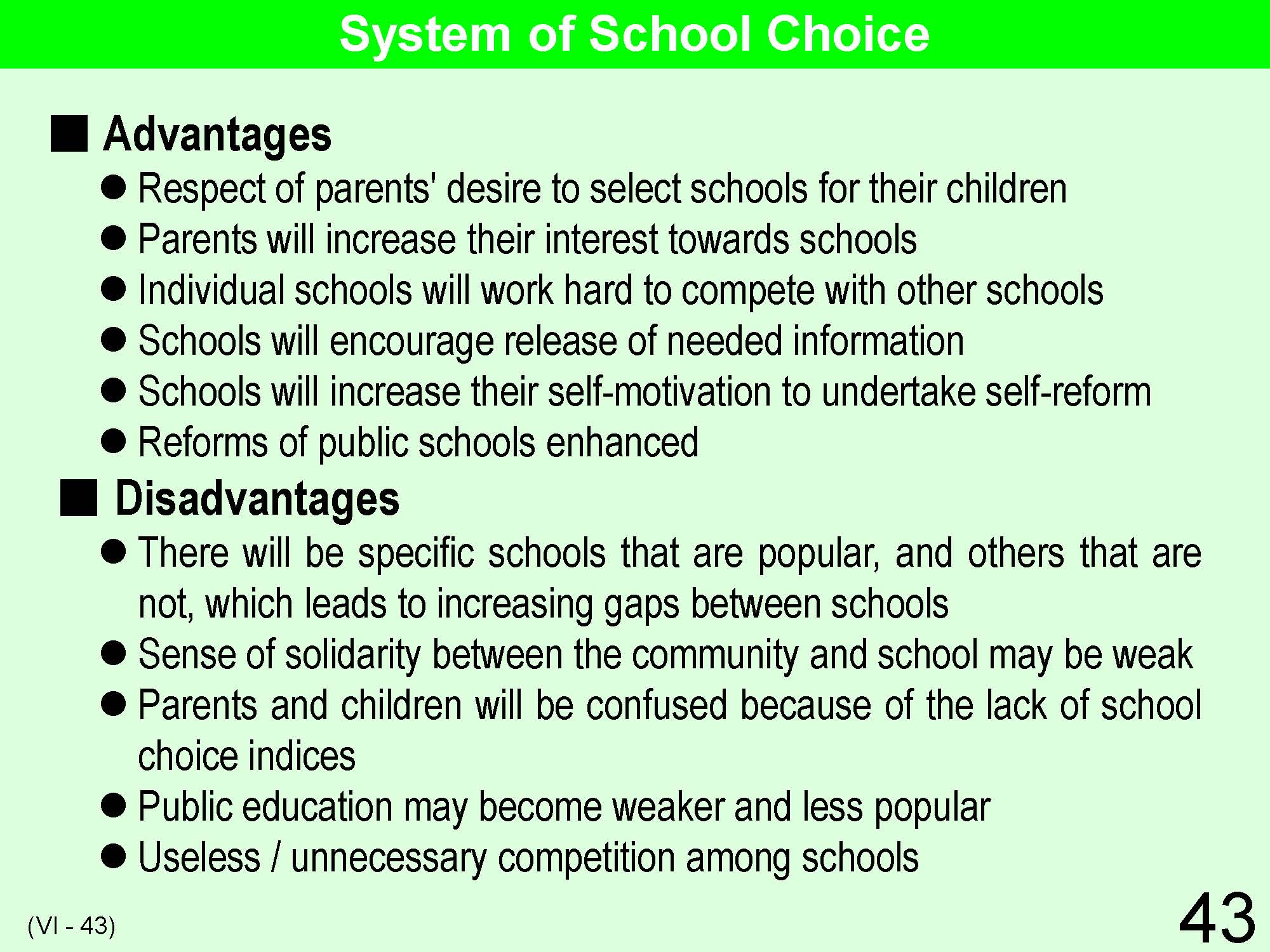 |
School choice system was introduced to respect guardians' will to choose school for their children. When guardians have right to choose school, each school would promote education with distinctive features with more efforts. School now take efforts to gain trust from guardians by improving school through self-inspection/self-evaluation. On the other hands, school choice system may increase gap between schools, weaken the solidarity between school and the community, and weaken public education. At the current, about 10% of public elementary/lower secondary school are introducing school choice system. |
| 44 | 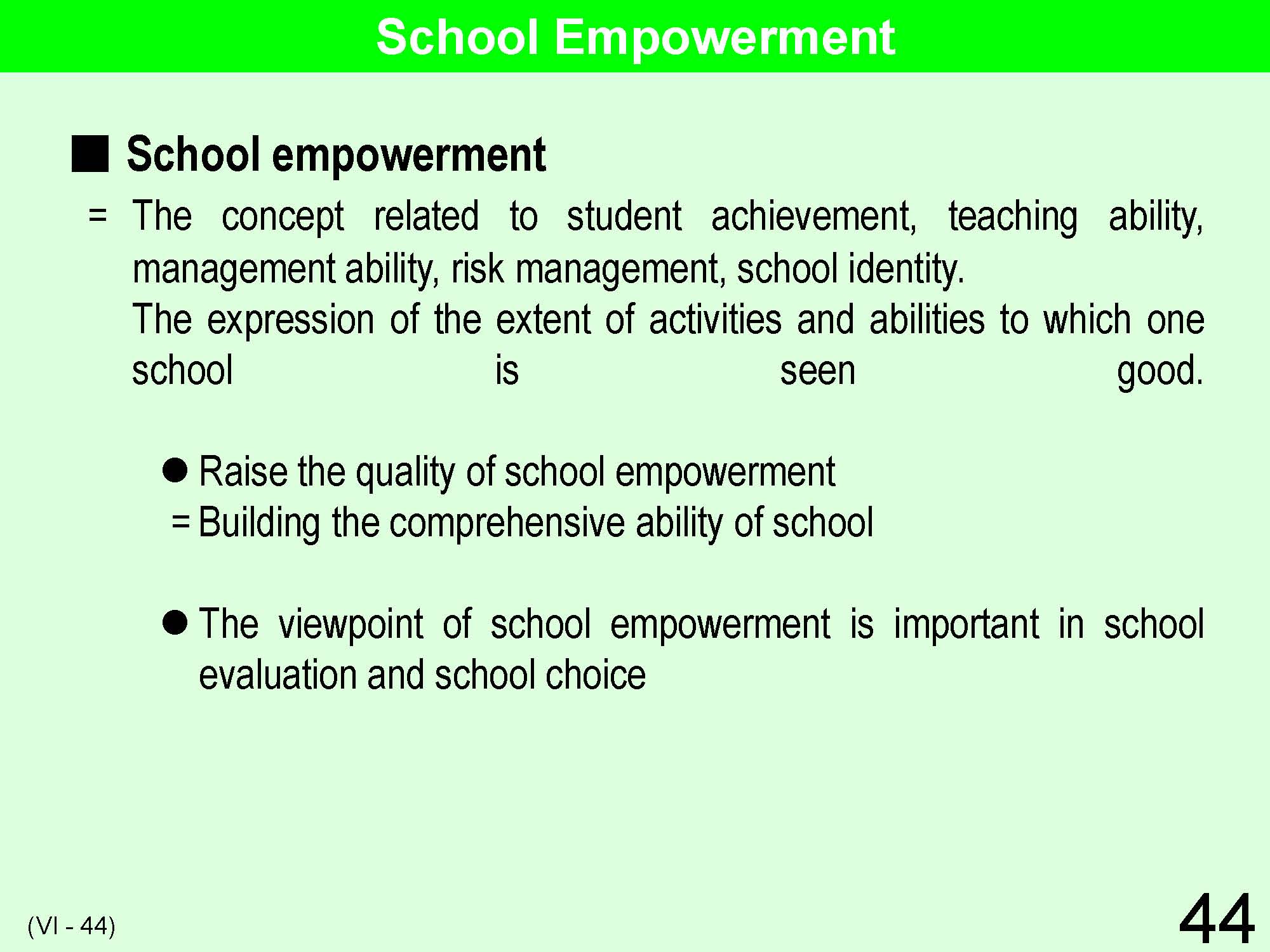 |
|
| 45 | 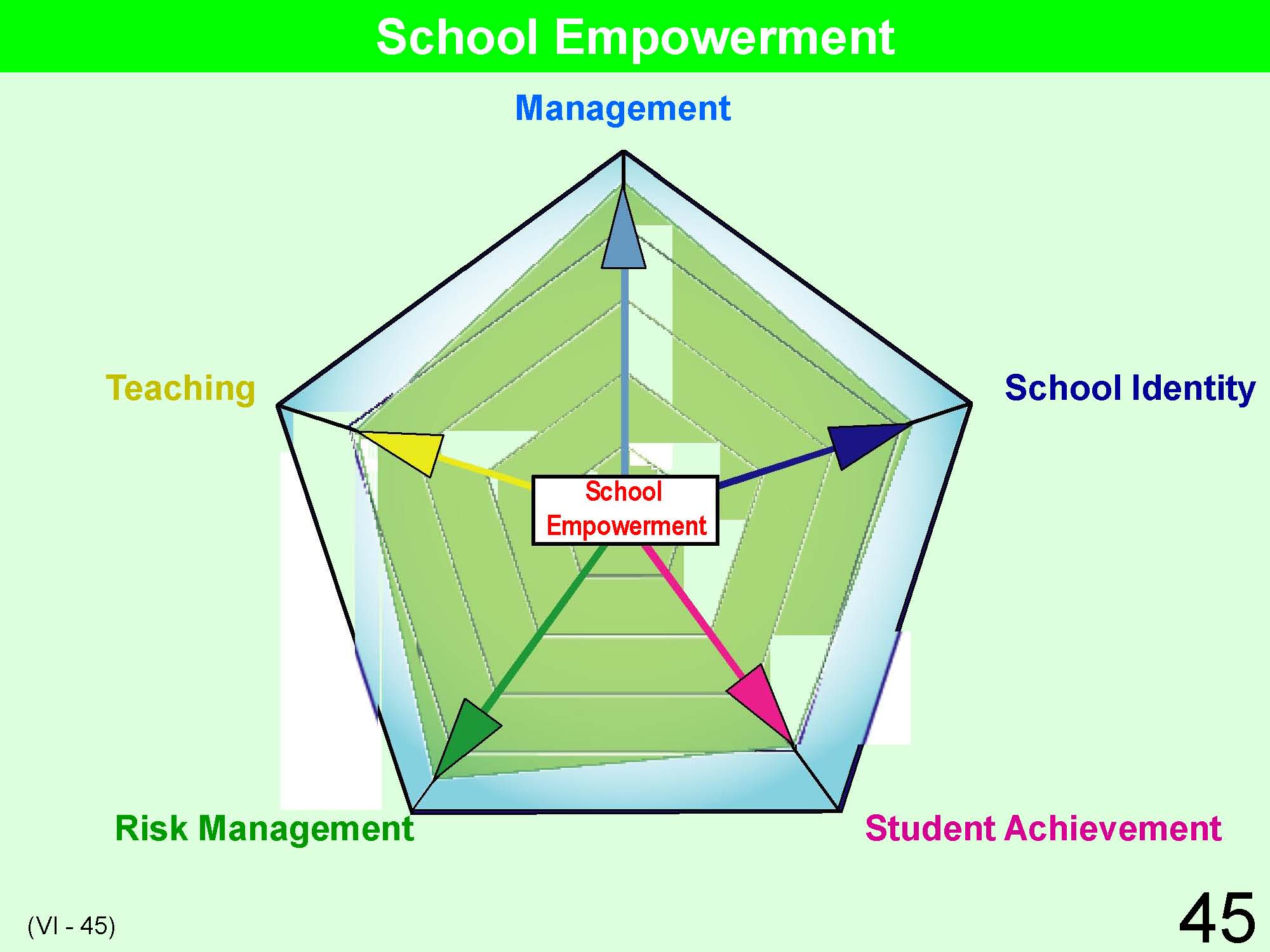 |
School empowerment is considered to consist of student achievement, teaching, management, risk management, and school identity. Each school may have different priorities among the above elements. In addition, it is difficult to compare schools since they may have different elements of school empowerment. Individuality, characteristics and strength of a school can be seen by examining schools through school empowerment. |
| 46 | 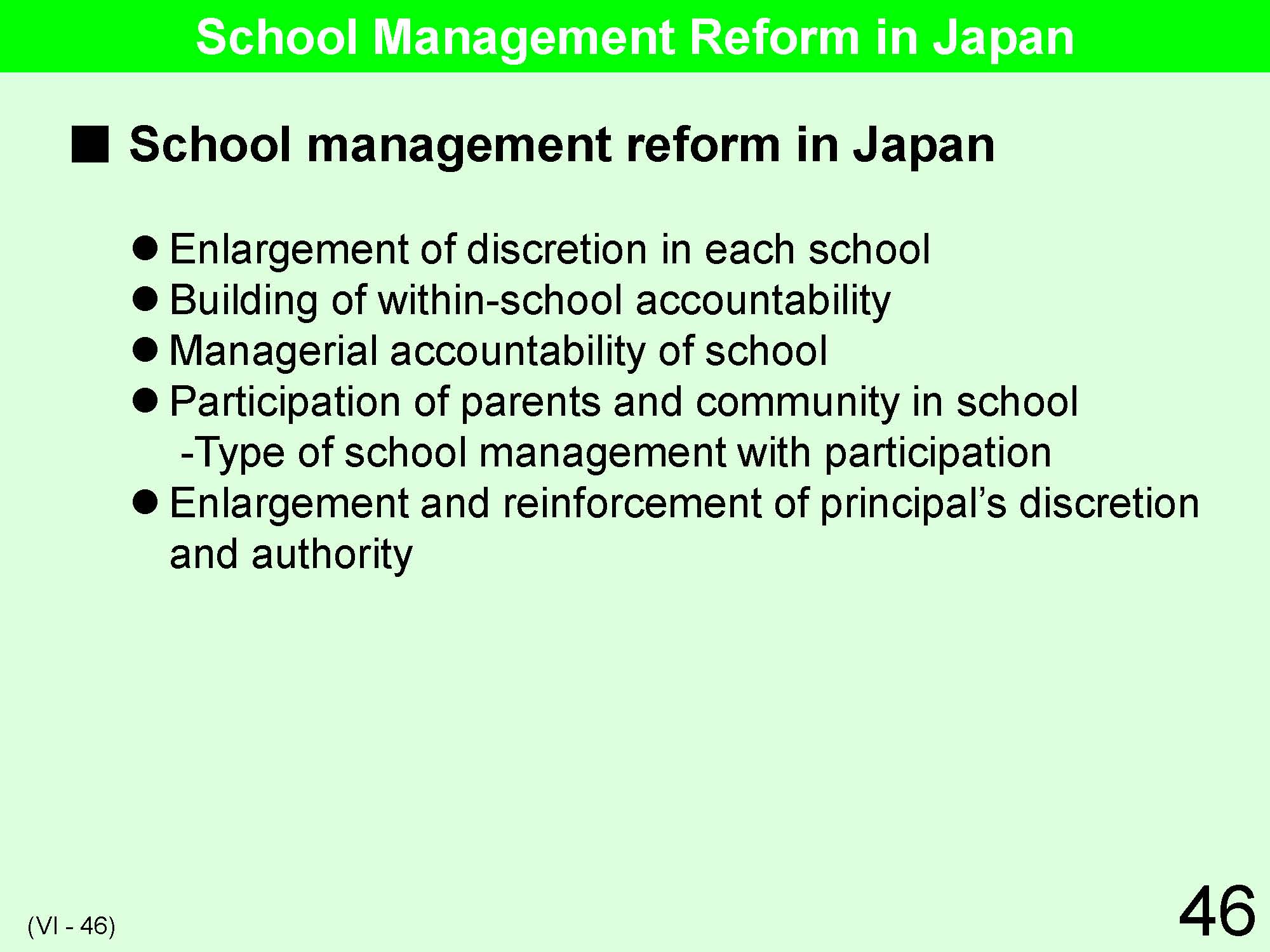 |
The reports of the Central Council for Education in 1998 titled “Regional Educational Administration in the Future” has greatly changed the basic tone of school management, aiming to establish independence and autonomy of schools. Previously the basic tone of school management was reduction of discretion in each school, school management led by the government, and establishment of within-school management systems through educational centralization. New policies have changed the tone, such as to aim at enlargement of discretion in each school and realization of school management with participation. The school management, which had been led by the government supported by board of education, is now making progress towards realization to establish autonomous school management. |
| TOP | ||
Please send your comments and concerns here
kamada@criced.tsukuba.ac.jp
Center for Research on International Cooperation in Educational Development (CRICED) University of Tsukuba
1-1-1, Tennodai, Tsukuba-shi, IBARAKI
305-8572 JAPAN